





















“Illustrating a column with this title is very much out of my comfort zone,” says illustrator John Cuneo. “But even at this scale, any opportunity to draw Mick Jones is a reason to be cheerful.” p30

“The best-laid schemes o’ mice an’ men an’ crooks an’ idiots an’ politicians an’ bosses an’ pretty much everybody else gang aft agley,” points out journalist Andy Simmons p62

“The internet has certainly generated well-paid and stimulating jobs for a few,” says author
Adrian Hon. “But the truth is that it’s also turning millions of interesting jobs into drudgery.” p90


ever


One of the best things about our May issue is that we announce the winners of our 100-Word Story Competition. This is the fourth year we’ve run the contest and it’s as much fun and as popular as ever. Huge praise to everyone who took part. Your stories provided me and the rest of the magazine team with hours of wonderful reading—and some very tough judging decisions. Turn to p43 to find our top tales.
For a particularly interesting take on life, go to p28. Among Richard Reed’s “If I Ruled the World” suggestions is “young and old would be taught the basic principles of happiness”. Now that’s a Reader’s Digest value if ever I heard one! And while we’re looking on the bright side of life, find out how Terry Jones is preparing for Monty Python’s first live





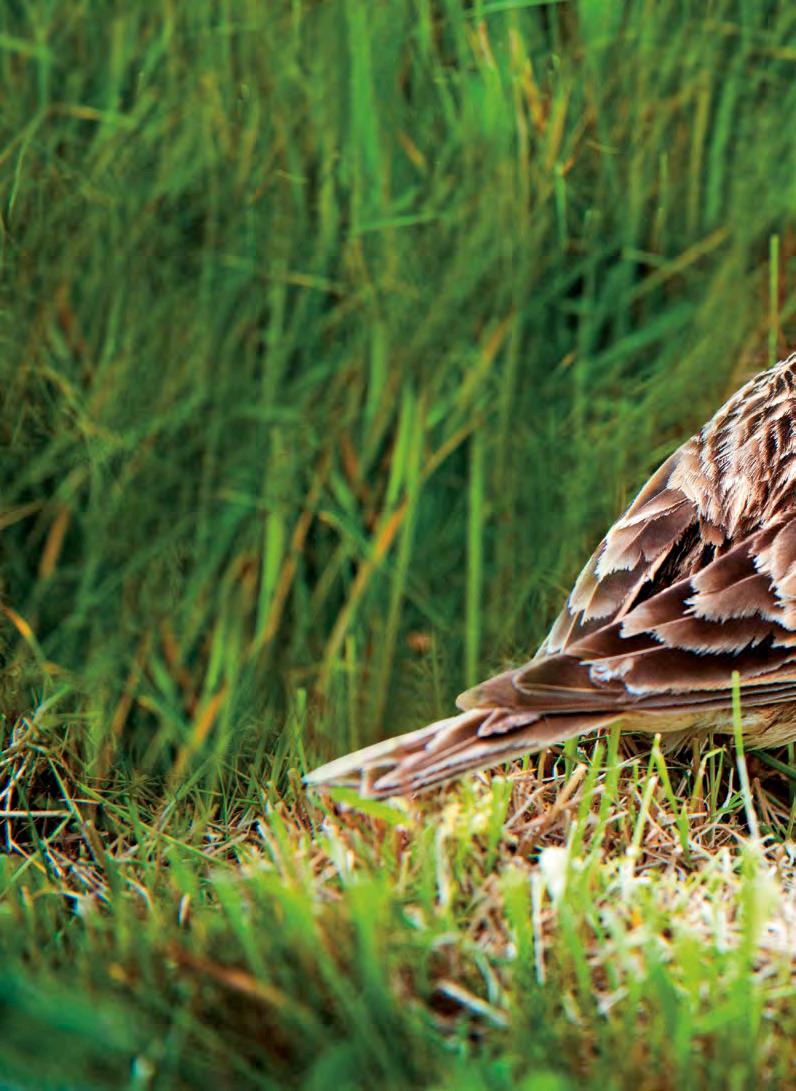
Survival of the fittest! That’s why skylark chicks (or alauda arvensis in Latin) jut out their necks and stretch open their mouths as soon as they notice a movement near their nest. Their striking red throats signal to the parents to feed them. After about 30 days, the young birds are independent and set out into the world—the ground-nesting birds are at home all over Europe. Sadly, their population is strongly endangered, mostly due to agricultural intensification.
Previous s P read: animal P ress; this s P read: m ike Po wles/ s u P er s tock/ c orbis
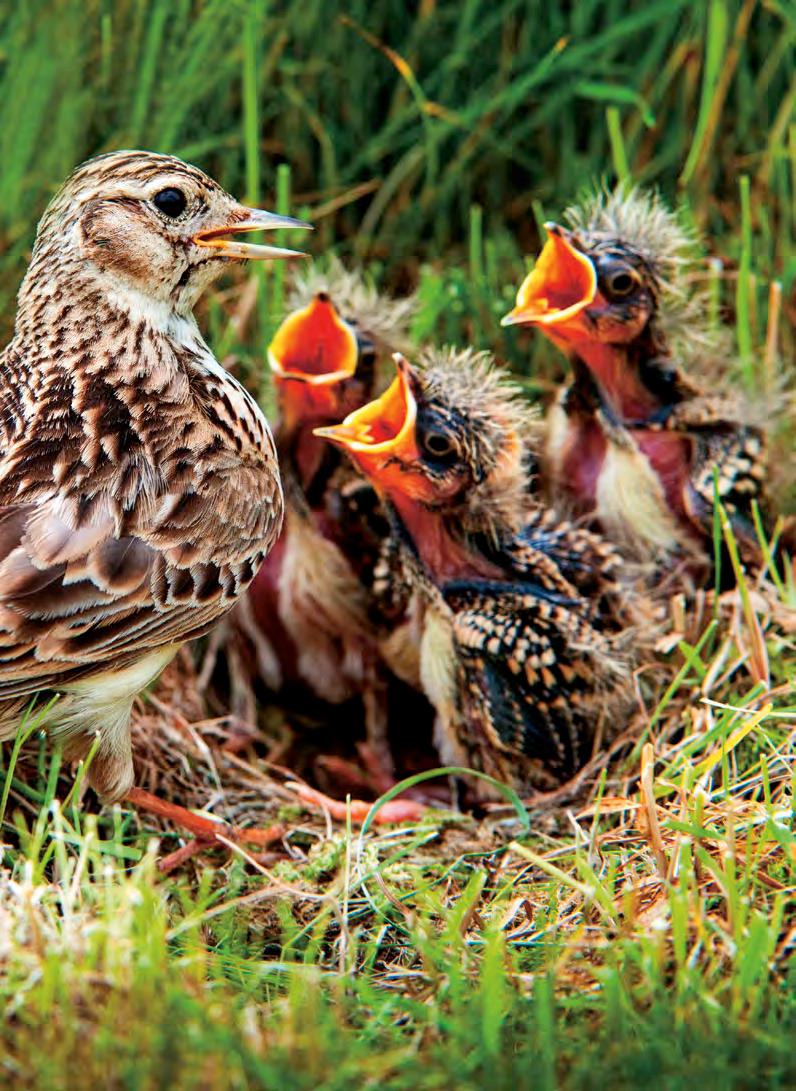
Send us your stories, jokes and letters—if we publish, we pay!
£50 for the star letter and £30 for regular letters.
Email readersletters@readersdigest.co.uk or go to readersdigest.co.uk/contact-us
£50!


£50 for the true stories, anecdotes, jokes in Laugh! and You Couldn’t Make It Up…, and contributions to end-ofarticle fillers, Travel and Gardening.
Email excerpts@readersdigest.co.uk or go to readersdigest.co.uk/contact-us
Visit readersdigest.co.uk or write to: Reader’s Digest, PO Box 7853, Ringwood BH24 9FH. UK: £45.48 a year. Republic of Ireland: €61.20 a year. Prices include delivery. For Gift Subscriptions contact Customer Services below
cuStomer ServiceS talking magazineS
Contact Customer Services for renewals, gifts, address changes, payments, account information and all other enquiries. Phone: 0871 351 1000 (Calls from a BT landline will cost 10p a minute. Call costs from other providers may vary.) Email: customer_ service@readersdigest.co.uk
Minicom: 0870 600 1153.
twitter.com/rdigest
Reader’s Digest is available in a talking edition for blind and partially sighted people for £16. For details, phone: 01435 866 102; email: info@ tnauk.org.uk, website: tnauk.org.uk.
facebook.com/readersdigestuk
Ensure submissions are not previously published. Include your name, email, address and daytime phone number with all correspondence. We may edit letters and use them in all print and electronic media. Contributions used become world copyright of Vivat Direct Ltd (t/a Reader’s Digest).
We cannot acknowledge or return unpublished items or unsolicited article-length manuscripts. Do not send SAEs. Articlelength stories, poetry and cartoons are not requested.
pinterest.com/rdigest




visit our website for…
Fast Food Ever find yourself struggling to find that quick and easy recipe you need at the last minute? Struggle no more. At readersdigest.co.uk/food you’ll find yourself in recipe heaven. Tasty carrot soup?
Speedy chicken risotto? Cupcakes in three easy steps? We’ve got the lot—and much, much more! What are you waiting for?







Jersey brims with unforgettable places waiting to be explored. Tranquil places like Elizabeth Castle, perched on a rocky islet in St Aubin’s Bay, the island’s defence for over 400 years. Magnificently preserved places like Mont Orgueil Castle and mysterious places like Neolithic La Hougue Bie, one of Europe’s finest ‘passage graves’. Thought-provoking places such as the award-winning Jersey War Tunnels, which tells the story of the five-year German Occupation and the ever-present remains of coastal fortifications built by Hitler as part of his ‘Atlantic Wall’. Add a mild climate, easy travel by air or sea from the UK and great-value o ers, and you’ve discovered Jersey.
jersey.com






£30 For eAch puBlished letter, £50 For the letter oF the Month! see p8 For More detAils


Although Lord Adonis’s suggestion in “The Maverick” that the House of Lords be relocated to the north makes sense from an economic point of view, it won’t make the public any more trusting of politics. That kind of reform needs to come from within the parliamentary process itself. Also, it fails to take into account the iconic status of Westminster. Parliament has met there since the Middle Ages, and the historic associations between Westminster and the Houses of Parliament are too strong to be severed.
In fact, I feel that Westminster Palace and Parliament should have featured in your list of great British inventions, especially as these have the greatest influence over our everyday lives. These are the institutions that have set the pattern for many democracies throughout the world.
Maggie Meredith, BathHow refreshing to read James Brown’s “Reasons to Be Cheerful”. I’ve always been a technophobe and more than once I’ve been labelled a Luddite. Unsurprisingly, I don’t use Skype or Twitter or Facebook, nor do I spend hours surfing the net. It always saddens me to see how many children and indeed adults prefer sitting inside glued to their devices.
It’s time to put technology back in its place—it’s there to serve our needs, not to dictate our every waking moment.
Jennie Gardner, Bath
As James’s article points out, modern life is so frantic. I often feel guilty when I’m not multitasking. I rarely sit down to eat without simultaneously checking emails, and I’d never allow queueing time to be dead time when there’s social media to orchestrate. Even when out with friends, I note with sorrow that several will be busy notifying the Facebook world of our antics rather than earnestly engaging in them. But are we really busier or more vital than ever before?
Anita Faulkner, Gloucester

april may @aprilmaywilson

My younger brother gave me a subscription to reader’s digest It’s the best gift he’s ever given me.
jobs for the boys?
I enjoyed “Into the Danger Zone”, which explored three hazardous occupations: stuntman, army helicopter pilot and bodyguard. Unfortunately, I found the overpoweringly male presence in the interviews puzzling. As a young female teacher, I’m constantly battling against stereotypes. It seems that kids are still being made to believe there are genderspecific roles in our society. I’d love to be able to show them an article on a female bomb-disposal expert or a male nursery teacher. hannah soulsby-phillips, dorset
RD: Thank you, Hannah. As it happens, we have published an article about an inspirational female bomb-disposal expert. We’ll send you a copy.
You shouldn’t be lauding John Logie Baird as the inventor of TV (“Best of British: Inventions”). His first transmission of an image using a mechanical contraption had no effect on electronic TV. How about the Briton J J Thomson who discovered the electron, the Russian-American Vladimir Zworykin who invented
the cathode-ray tube, or the American Philo Farnsworth who invented the camera tube? Mervyn Vallance, essex
being assertive
I was moved by paralympic athlete Tanni Grey-Thompson’s “I Remember”, particularly her comment that she’s occasionally treated like she’s stupid. My mum’s been in a wheelchair for two years, and I’m amazed by some people’s attitude towards her. A few weeks ago, my mum and I went to get our hair done. As we were chatting about hairstyles, the hairdresser came over, said hello to me and asked, “Is it OK if I wash her hair?”
When such things happen, I just stay silent. My mum answers quite politely, “I have some problems with my legs, but my voice works perfectly well.”
Mary Mcneilly, essex
role play
“kids are stiLL being Made to beLieve there are genderspecific roLes in our society”
It’s a courageous doctor who will admit to a nurse’s unique knowledge and expertise, and Dr Max Pemberton has done just that in his column. My daughter is a wonderful nurse, but she’s wise enough to know there’s a difference between doctors and nurses. Sometimes we come across a nurse who thinks she’s a doctor, and this can be a dangerous assumption. philippa sampson, devon
Every year thousands of people put their faith and trust in Cats Protection when looking for a new addition to the family.
Behind each volunteer and member of staff is a wealth of experience and expertise which means when you adopt one of our cats, you can feel safe in the knowledge that he has been given the best possible care.
When he leaves Cats Protection, your cat will have been treated to a top-to-tail medical.
This means he will have been:
• Fully examined by a veterinary surgeon
• Vaccinated at least once against flu and enteritis
• Treated against fleas, roundworm and tapeworm
• Neutered if old enough
• Microchipped

We also provide four weeks’ free insurance (terms and conditions apply) giving invaluable peace of mind and reassurance as you and your cat embark upon this lifelong friendship.
All he needs now is a loving home to make his dreams come true – over to you!

Find a Cats Protection cat looking for a home in your area. Simply scan the QR code with your smart-phone to use our new find-a-cat search tool, or get in touch on the details below. Thank you.
T: 03000 12 12 12
E: helpline@cats.org.uk
W: www.cats.org.uk
Reg Charity 203644 (England and Wales) and SC037711 (Scotland)






Building



over 30 years






innovation and research, the Bose® Wave® music system III delivers awardwinning, room-filling quality sound, yet the entire one-piece system takes up less space than a single conventional speaker.
e features you want

credit-card sized remote offers one touch control of all the system’s functions. And being compact, the Wave® music system III fits neatly just about anywhere – so you can enjoy all kinds of music in all kinds of places.
e system’s front-loading CD player and digital DAB/ FM/AM tuner offer you two ways to experience your favourite music, while the digital display shows track information as you listen. Touch-top controls turn the system on, off and snooze the alarm, and the slim,

We believe the best way for you to appreciate the Wave® music system III is to experience it in your own home. So call now and listen for 30 days without risk or obligation.
Why wait any longer? Hear for yourself why Bose is one of the most respected names in sound.
FREE WAVE® III DOCK* Easily play music from your iPhone / iPod on your Wave ® music system III, and charge your selected Apple device while it’s on the dock.
Limited offer valid until 30th June 2014.
iPhone not included.
*Wave® III dock not compatible with iPhone 5 or iPod shuffle. Apple Inc. is not participating in this promotion.
**Payment plan is available on credit/debit cards only and is subject to status. An initial deposit is due at the time of order and all payments will be charged to your credit/debit card. If the product is returned, the deposit is fully refundable. There will be no interest charges from Bose. In the event of late payment, credit/debit card company interest charges may apply. Delivery is subject to product availability, clearance of payment and security checks and can be up to 10 days from when Bose receives the order. Price/Paymentplan/Offer subject to change without notice. Free shipping offer applies to UK standard delivery only. Risk free refers to 30-day home trial only. ©Bose Corporation 2014. All rights reserved. The Wave® music system’s
r a d ar
your short, sharp guide to may

in cinemas
Comedy: The F Word Daniel Radcliffe plays unlucky-in-love Wallace, who’s forced to play the “friendship” game after becoming infatuated with an unavailable girl (Zoe Kazan) he meets at a party. It’s a modern take on the old question—can men and women ever be pals?
RomanCe: Blended This is the third teaming of Adam Sandler and Drew Barrymore on the big screen, and you know what to expect: a classic odd-couple romance with a good dollop of sentimentality thrown in. The twosome play a

Platonic relationship: Zoe Kazan and daniel Radcliffe in The F Word
sulky pair stuck together at a family resort with their respective children—but will antipathy turn to affection?

Big Budget: Godzilla Summer 2014 is replete with remakes and sequels, but this reboot of the Godzilla franchise by British director Gareth Edwards—the man behind the beautiful low-key sci-fi Monsters—will be one of the most spectacular. Elizabeth Olsen and Bryan Cranston (of Breaking Bad fame) head the cast.
animation: The Wind Rises
Nominated for a Best Animated Feature Oscar, this beautiful Japanese film is based on the fictionalised biography of Jiro Horikoshi, who wants to build beautiful planes, but finds that his Mitsubishi A5M is to be used in the Second World War.
the mitsubishi a5m takes to the skies in The Wind Rises

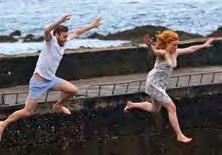
dRama: Run & Jump
This taut narrative follows the Irish Casey family, whose lives are turned upside down when husband Conor (Edward MacLiam) suffers a rare stroke that changes his personality. Maxine Peake (from BBC1’s Silk) also stars.
tv highlights
Look out for the return of Jack Bauer in 24: Live Another Day.

reader
radar
emily Crawley, pilates teacher
our pick of the dvds
The Wolf of Wall Street
Leonardo
DiCaprio chews up the scenery as rogue trader Jordan Belfort in Martin Scorsese’s black comedy.

Watching: The Great British Sewing Bee (BBC2) I like the idea that I could now whip up a dress out of an old bed sheet, should the need arise.
Reading: Midnight’s Children by Salman Rushdie The magical world Rushdie creates is writing at its absolute best.

The Railway Man Lush adaptation of the acclaimed memoir by Eric Lomax (played here by Colin Firth), recounting his harrowing experiences in a Japanese POW camp.
online: thedonation.org.uk
A different kind of sponsorship website, through which you make pledges of sustainable actions— from going veggie for a couple of months to cycling to work. I love the concept of giving by doing.
Listening: Pure Heroine by Lorde An amazing voice, and still only 17.
your short, sharp guide to may this month’s gadgets

technology expert, BBC 5 Live presenter and Answer Me This! podcaster olly mann reveals the latest must-haves
May 1–5
City of derry Jazz and Big Band Festival
May 5–11
grand designs
Live, London
May 14–18
Royal Windsor Horse Show
May 20
england v Sri Lanka, twenty20 international, The Oval
May 22–June 1
Hay Festival, Hay-on-Wye
Sesame app, £2.99 for ioS In theory, it’s convenient to use a tablet to refer to a recipe while you’re cooking. But when your fingers are coated in flour, you’re holding a kettle in one hand and a knife in the other, you don’t want to be zooming in to photos or scanning through

a web page. But this app, compatible with most recipe sites online, saves the details of the dishes you’d like to make and lays them out so they’re straightforward and readable, even when you don’t have a web connection. Bon appétit!
Lacie Fuel, £169.90 With this portable storage drive, you can relay up to 1TB of stuff wirelessly from your computer to your mobile devices and vice versa. That’s around 500 movies or 190,000 photos, thereby massively expanding the capacity of your phone and tablet. The hardware is sleek and quiet, but the software (a web platform for desktop; an app for mobile use) is rather unsightly—and transfer speeds could be faster.

and check out…
Corkcicle, £20

garmin dash Cam 10, £169.99 Black boxes are no longer exclusive to jetliners. This camera’s wide-angle lens captures the road in high-definition as you drive and senses if you’ve had an incident, preserving the footage.
The gadget that demanded to be invented: an in-bottle wine chiller! Freeze it, stick it in your bottle of white and it keeps your plonk at a perfect temperature for an hour. Then throw away your ice bucket! n

¶ on the first night of our coach holiday, my husband and I joined in with a game arranged by the tour guide to break the ice among fellow travellers—we were given famous lines from films and had to guess which ones they came from.
The game went OK, but the atmosphere was still rather quiet and you could tell people were reserved about shouting out the answers.
Until, that is, the tour guide read out the line “Women and children first.”
“Jaws?” shouted out one bright spark, before anyone else had the chance to answer.
The coach was reduced to tears of laughter, which made it hard to carry on.
Margaret Reed, Peterborough
“the french always manage to carry off the whole flesh-eating-zombie thing with such panache…”
¶ When I returned home one day with the weekly shop, my youngest son asked if he could help put anything away. I told him to take the toilet roll upstairs and pop it in the loo.
He duly obliged—but when I went to the bathroom a couple of hours later, I found the roll swimming in the toilet bowl… Rachel Watkeys Dowie, Oxford
¶ It had been a stressful Christmas, with a number of our grown-up children and their partners spending the holiday with us. We were all on our way to Durham and the car was full of noise as we stopped for petrol. While my wife filled the tank, I wrote a note on the back of one of my business cards: “I can’t wait for us to be alone again.”
She read it in silence, then whispered, “Me too.”
Some weeks later I had an appointment with the director of a company, and on arriving at reception I left the same business card with his receptionist.
It was only much later that I realised what I’d done!
Barrie Marklew, Yorkshire
¶ A friend of mine was listening to his grandson chat about a recent James Bond exhibition. “There was a car that swam underwater,” he enthused.
My friend told him that it was a Lotus Elite, a very special car.
His grandson thought about this for a while, then said, “Why did it go underwater if it leaked?”
Valerie Griffin, Dorset
¶ One dark morning, I walked downstairs and started talking to our cat Mimi in the half-gloom; she always sat on the telephone seat in the hall. But I couldn’t understand her lack of reaction to my various greetings.
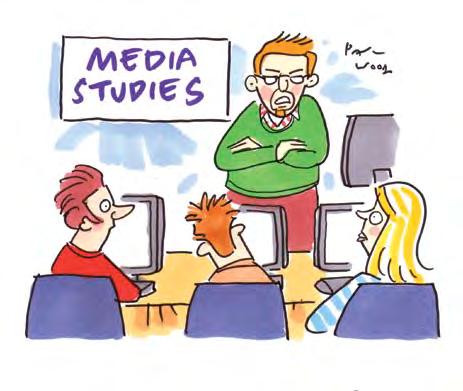
“oK, which of you jokers submitted their essay on paper?”
Puzzled, I finally switched the hall light on—to discover that I’d been having a conversation with my wife’s black handbag.
Philip Carroll, Surrey
¶ We often go to church on a Sunday, and one weekend we asked my grandmother, who was staying with us, to come along too, even though she’s not a Christian.
When the collection plate came round, she brightened up
¶ i bought some new cream-coloured canvas shoes last spring, but was upset to find that they were badly stained a week later. Then I had the brilliant idea of cleaning them with foam
Win £50 for your true, funny stories. go to readers digest.co.uk/ contact-us or facebook. com/readers digestuk
carpet cleaner, and they came up just like new.
a bit. A little too loudly, she said to me, “We’ve paid now—can we please go home?”
Deena Colworth, Cambridgeshire
¶ I was in Newcastle with my son when we walked past a statue of Cardinal Basil Hume in full regalia. I asked my son if he knew who the great man was.
“Oh yes, Mum, I do!” replied George proudly “It’s Darth Vader from Star Wars!”
Marita Berndt, Northumberland
Later that week, I was caught in a downpour while waiting for a bus. As I made my way to a vacant seat, I noticed that people were
either smirking or looking at me sympathetically.
I glanced down at my feet and realised my canvas shoes had disappeared in a cloud of foam.
Bea Wilkinson, Devon ■































































Shop till you drop!

Before you do your next Antiques Roadshow impression and start haggling over prices, master this selection of high street or market phrases. When you’ve finished dealing, answer A, B or C below.
1 meretricious adj
A falsely or tawdrily attractive B eager to sell C worth more over time
2 bodega n
A bookstore B hairdresser’s C wine shop
3 bric-a-brac n
A miscellaneous objects
B small stall C antiques
4 haberdasher n
A pushy salesman
B dealer in sewing goods
C mender of shoes
5 caveat emptor
A Let the buyer beware
B Everything must go
C First come, first served
6 patronise v
A to visit as a customer
B put up sale signs
C argue
7 shopwalker n
A browser who never buys
Geobragging
Yet another neologism thrown up by social networking, this describes someone who constantly updates their Facebook status in different locations, to look adventurous and make others jealous.
RD Rating: Useful? 6/10 Likeable? 4/10
B shoplifter C roving sales supervisor
8 mercantile adj
A spending freely
B using false tactics C of buying and selling
9 haute couture n
A pots and pans
B designer tailoring
C bicycle shop
10 millinery n
A women’s hats
B grains and flours
C paper goods
11 charcuterie n
A cafe curtains
B hair salon C deli specialising in meats
12 estaminet n
A price drop
B small cafe
C shopping spree
13 chaffer v
A to haggle B advertise aggressively C hoard
14 defray v
A to lose value
B provide payment C offset
15 monger n
A broker or dealer
B cheapskate
C dishonest merchant
►
Words by Emily Cox and Henry Rathvon9–11 getting there
12–13 impressive 14–15 word-power wizard!
1 meretricious A falsely attractive. “That skirt is flattering, if not a little meretricious.” Latin mereri (be hired).
2 bodega C wine shop. “June sipped sangria in the bodega doorway.” Greek apothéké (storehouse).
3 bric-a-brac A miscellaneous objects. “The junk shop was full of bric-a-brac.” French à bric et à brac (at random).
4 haberdasher B dealer in sewing goods. “Sue gets her buttons from the local haberdasher.” Anglo-Norman French hapertas (perhaps the name of a fabric).
5 caveat emptor—A
Let the buyer beware. “At the altar, the priest should have put a caveat emptor sign on my husband!” Latin.
6 patronise—A visit as a customer. “One more snide look from that assistant and I’m going to stop patronising this shop.” Latin pater (father).
7 shopwalker C roving sales supervisor. “Our new shopwalker may as well be a mannequin for all the help he offers.”
This word can be traced to Captain Charles Boycott, a British land agent in County Mayo, Ireland. In 1880, the Irish Land League— which wanted tenant farmers to own the land they worked on— organised a campaign of isolation against Boycott, whom they accused of nasty behaviour towards his tenants. It might have remained a local affair if Boycott hadn’t written an outraged letter to The Times, and boycott came to mean a general withdrawal from commercial or social relations.
8 mercantile—C of buying and selling. “Jim has been in the mercantile trade since his very first football-card swap.” Italian mercante (merchant).
9 haute couture B designer tailoring. “Tom thinks that flip-flops are haute couture.” French.
10 millinery A women’s hats. “The price tag put an end to Clare’s search for a trademark piece of millinery.” Middle English milener (a vendor of fancy goods from Milan).
11 charcuterie C deli specialising in meats. “I can’t wait to try the
Play WP online: go to readersdigest. co.uk/wordpower

sausage from the local charcuterie.” French chair (flesh) and cuite (cooked).
12 estaminet B small cafe. “Looking for a good cup of coffe? Try the estaminet near the station.” Walloon stamine (cow shed).
13 chaffer A haggle. “Twenty minutes of chaffering and you only got a £1 reduction?” Old English ceap (a bargain) and faru (journey).
14 defray B provide payment. “Bill’s parents have defrayed the cost of his rent.” French frais (cost, expenses).
15 monger A broker. “The Italian monger sells great olive oil.” Latin mango (dealer). n

Our fantastic invisible hearing aid is small. Really small. And, because it fits slightly deeper in the ear canal than your average hearing aid, it’s virtually invisible when worn. That means you get all the benefits of hearing better without anyone understanding how you do it.
Whilst it can’t be seen the difference can be heard.
Just because this hearing aid is small doesn’t mean it’s less effective. We’ve made sure this tiny device has the high speed processors and clarity enhancing features of the very latest hearing aids. These are the things that make sure you get to enjoy all the great things life has to offer like conversations with friends and family, an evening out in your favourite restaurant or a cosy night in front of the TV. And you can enjoy all this with the confidence that whilst people might notice the difference in your hearing they definitely won’t notice your hearing aid.
If you like what you (don’t) see, call 0845 203 7662 and book a free appointment in store to find out more about this amazing little hearing aid.
“I hear normally, it’s as if I don’t have a loss and, because you can’t see them, no one else knows I do!”

To book your hearing check simply call 0845 203 7662
Terms: Only one hearing check per year. Free hearing check for over 18s only. Subject to availability and eligibility. By appointment only. Call 0845 203 7662 (local rate, calls may be recorded for training purposes) between 8.30am and 6.00pm (Mon-Thurs), or 8.30am and 5.30pm (Fri) and 9.00am and 5.30pm (Sat). Valid until 27 May 2014.

After selling his stake in the Innocent smoothie company, Richard Reed co-founded Jam Jar Investments, which backs young entrepreneurs, Art Everywhere, the world’s largest art show, and The Reed Page Foundation, which funds peace-brokering and environmental initiatives across the world.
I’d make the Arctic a global common as an example of how we should be thinking about natural resources. it’s a huge step backwards that several countries are now looking for a slice of the arctic. ideally earth should be the “common heritage of mankind”—like an international park that we’d look after to enrich the future. We’re often faced with the dilemma between short-term gratification and long-term gain. it’s like doing revision; it sucks in the short term because it’s hard work and you’d rather be with your mates, but getting those exams under your belt will help throughout your life. We need to think about reaping benefits for the long-term good of our planet.
Children would be taught personal effectiveness skills. after i went on a public-speaking course i learned how to use my fear as a positive energy and now i’m quite good. and a time management course was massively helpful, not just in business but in my daily life. i’d also remind kids that good things happen to you in direct proportion to the amount


of energy, effort and focus you put into them. the idea that there is a certain type of person who can succeed and another who can’t is a falsehood. setting up your own business is the most equalopportunity playing field of all—you can do it at any age, from any background. Just find the thing you connect with and then commit to it.
All businesses would give ten per cent of their profits to charity. this was our business model at innocent. if every profitable business did the same we could fundamentally change the distribution of wealth while still working within the
capitalist system. the world would revolve to a slightly better beat if greater emphasis were put on doing some good when success allows.
I’d put up viewing platforms so people could enjoy the sunset. the innocent building was at the top of a hill in west london and i used to send out an email to everyone in the office if there was a particularly good sunset. Watching beautiful sunsets is calming and connects you with nature. sunsets remind us to appreciate every single day; the death of one day always leads to the birth of another.
Young and old would be taught the basic principles of happiness. so much study has been done into anxiety and depression but happiness is a mental state too and can be achieved by learning certain ways of positive thinking and behaviour. is there anything more important?
The taxman would collect all the money that businesses owed. there’s a lot of media noise about benefit fraud which costs this country around £3bn a year but the amount of money that multinational corporations don’t pay in tax in the uK is around £34bn. they push the boundaries of what is legal. People doing business in a country should pay their fair dues.
“i’d banish feelings of shame. We all make mistakes”
I’d have demarcated and protected bike lanes on every road. by making cycling safer and easier it would be the best form of transport and that’s a win-win situation for everyone. cycling keeps you fit, it’s good for the environment and it creates a feeling of joy. it’s the closest you get to feeling like a bird in flight. i cycle in london and half the time i’m battling it out with three lanes of traffic. roads are made for all forms of transport; they’re not the prerogative of cars.
Parenting courses would be readily available. there isn’t a more important job in the world than being a parent. the more kids are loved appropriately the better adults they become, and the more they empathise and contribute to society. i’d do everything possible to ensure that parents get the right help and support.
I’d banish feelings of shame. We all make mistakes. i celebrate good and bad experiences because they prove we’re alive and that’s a fantastic miracle for which we should be grateful. so many people hold themselves back because of a fear of failure or worries about looking stupid and that’s a zero-gain attitude. do your best. Get on with it and enjoy life. n
As told to Caroline Hutton
Chance meetings and unlikely inspirations are among the
Travel broadens the mind, challenges the waistline and weakens the wallet. That’s what I find anyway. It can also help you start new friendships, strengthen mere acquaintances and cast an intriguing light on people you thought you knew better.
I’m just back from a great week in New York. Despite travelling there on my own, I found myself in the departure lounge
a taxi? He’d seen me wearing a Joy Division T-shirt, and he explained he was performing with the band himself on a number with poet Mike Garry, dedicated to the late Factory Records boss and TV presenter Tony Wilson.
I met Tim a few months ago as I was leaving a publishing-industry dinner. I’d read a moving article he’d penned about his wife dying and went over to say hello.

bar of Newark Airport on the way back, having a thoroughly good time with Joe, Tim and Mick, none of whom had ever met before we’d checked in that day. But I happened to know them all—albeit for varying amounts of time.
Mancunian Joe had introduced himself five days before as I’d proceeded through US customs. He wanted to know if I was going to see New Order and Iggy Pop at Carnegie Hall, and would I like to share
I showed him some funny images on Twitter that I thought would make great covers for his magazine, and we spent the final hour of the event in stitches.
Mick? Well, Mick is a beautiful guy everyone loves—not least because he was half the songwriting partnership that created London Calling. Just ask a music fan of a certain age if they’d like to spend an hour in an airport bar with Mick Jones from The Clash; they’d book themselves

a flight immediately. So when Joe said, “That guy looks like Mick Jones,” I poked my head round a pillar and replied, “It is! I’ve known him since I was 22.” I called Mick over and it set the scene for a very relaxing conversation.
Even though I knew all these blokes to some degree, there’s something enjoyable about the camaraderie that can strike up between people who’ve previously
normally reserve for very old friends. Humour really can bond people together. You don’t have to become best friends, but when you’ve found yourself in tears of joy with someone, that feeling stays logged inside you.
When like-minded people are thrown together like this, it can create lasting impressions. I recently read that John le Carré came up with the personality for
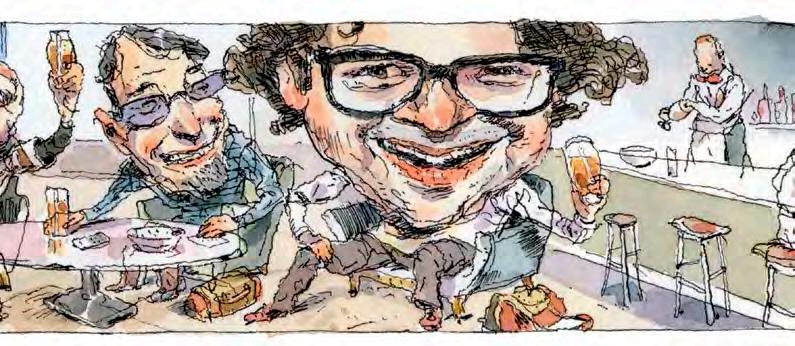
never met enjoying a travel experience together. Maybe that’s why the other three enjoyed the moment.
A few years ago, I spent a week in a giant canoe floating round the lakes in Ontario with a bunch of guys I’d never met before. Three of us laughed so much during the trip that there’s been an affectionate tone of mickey-taking in our exchanges ever since, the sort you’d
Alec Leamas, the central character in his novel The Spy Who Came in from the Cold, when an international traveller with a pocketful of varying currencies sat down next to him in a hotel bar, bought himself a drink, drank it and left. Something about him triggered a creative impulse in Le Carré’s mind that would propel him to international popularity. Paths that cross can lead to extraordinary destinations.
Nothing quite so possibly inspiring
Meeting people for different reasons in different places all adds adds to the experience
happened in our little gang of four, but Mick amazed the other two by talking at length about how “no two ferns are the same” and how he’d picked that up from a book of plants. He also recalled the night in New York when he and I went to see his former songwriting partner Joe Strummer front The Pogues in Manhattan, and then Joe and his gang came to watch Mick play with Big Audio Dynamite II. A truly great night, and I sometimes wonder if the memory is real.
Mick, Joe, Tim and I sat for an hour having a very comradely time until it
was time to board and we all set off to our separate seats. Now that was nice, I thought as I settled down to catch an episode of Family Guy. And it struck me that it’s something you can only do when you’ve been around long enough to have met people for different reasons in different places, with different experiences to bring to the conversation. n
James, founder of Loaded magazine, now edits Sabotage Times—an online magazine with the motto: “We can’t concentrate, why should you?” Follow James on Twitter @jamesjamesbrown
Of all the Twitter accounts on the internet, @inanimaterock—the musings of “a simple rock aspiring to break geological stereotypes”—has to be the most surreal (and oddly amusing):
“I saw the sunrise this morning. What a beautiful site. Still sitting on the ground.”
“Covered in snow and ice. Waiting for spring.”

“In another life, I could have been a nice round rock. One that rolls down mountains and sits quietly on a sandy beach.”
“I think carbon dating is incredibly rude. I’m only as old as I feel.”
“Feeling kinda sedimentary today.”
“There’s definitely some moss happening back there. Should I grow it long or keep it short?”
“I’m thinking introspectively about the long-term effects of erosion.”
“I don’t believe that paper would beat me in a no-holds-barred cage match.”















From sunrise to sunset the Bailiwick is full of surprises and simple pleasures.







27 unspoilt beautiful beaches, the prettiest harbour town in Europe, inspirational cliff walks, characterful castles, independent kiosks and honest hedge veg; all packed in to 25 sq miles.
Whether you’re indulging in ice cream churned from the milk of our famous Guernsey cows, taking seaside strolls, sampling seafood in St Peter Port or exploring one of our sister islands, there’s plenty to float your boat – everything is close to hand but you’ll feel away from it all, whilst relaxing in the subtropical climate.
Order your Free brochure today on 0800 028 5353 quoting ref: 17/5 VISITGUERNSEY.COM #REDISCOVERLIFE








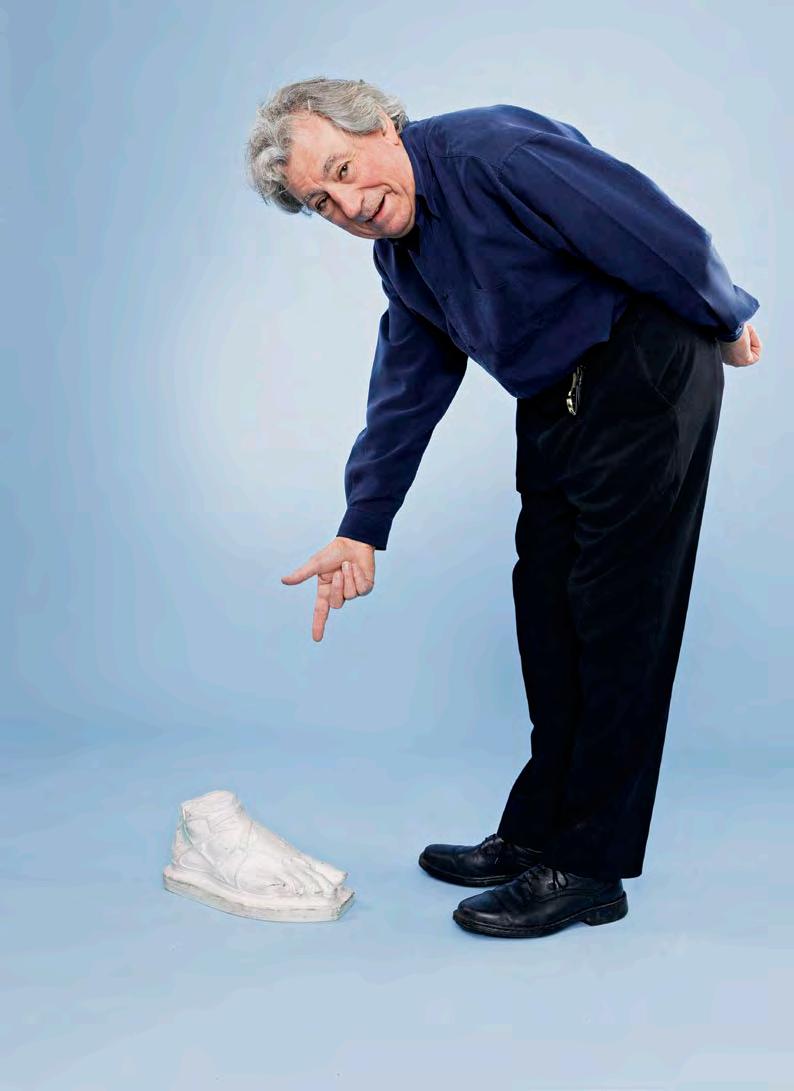
As the Monty Python gang get ready for their first live shows in more than three decades, Terry Jones tells us why he’s a “lucky blighter”
Photogra P hed by seamus ryan by bru C e dessau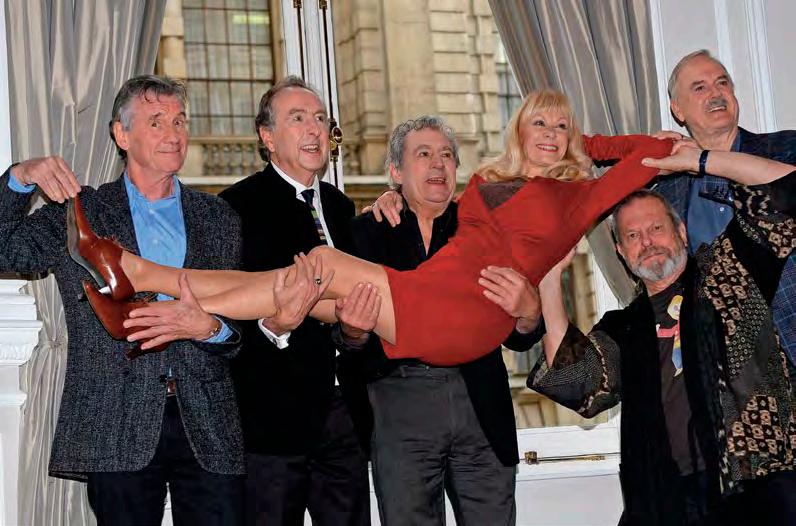
At an age when most sensible people might be toying with the notion of slowing down, 72-year-old Terry Jones seems to be speeding up. Maybe it’s something to do with all the espresso he drinks.
During our interview in the airy study of his modernist Highgate home, he repeatedly pops downstairs for another little cup of coffee. It seems to give him a burst of energy—and he’s going to need plenty of that in the coming months. He’s directing a film, working on a musical and, in case you’ve been living in a cave recently, performing on stage with the rest of the Monty Python team for the first time in 32 years.
While the media has had a field day wondering whether the comedy gods
will still be able to deliver the comedy goods after all these years at the enormous O2 Arena, Jones couldn’t appear more relaxed if it was a Sunday afternoon performance in a friend’s front room. “It’s all good. The size of the auditorium doesn’t inhibit me at all. Though I haven’t seen it yet!
“You’re [supposed] to have some nerves to get up on stage, but I’ve never suffered. We played to six million on television, so 16,000 fans is nothing. I used to go to sleep before the TV shows. Have a little snooze in the dressing room.”
None of the other illustrious members of the team—John Cleese, Michael Palin, Eric Idle and Terry Gilliam—seem that anxious either, according to Jones. “I think it’ll be exhilarating to play to a large audience. We don’t talk about nerves. It might make us nervous!”
He’s clearly looking forward to the group getting back together again, though they have been in touch over the years, both socially and professionally—Terry Gilliam and Michael Palin live nearby and Terry often meets “Mike”, as he calls him, in a Highgate pub. There haven’t been any full dress rehearsals yet, but there have been plenty of meetings. Eric Idle is directing and has written the script, dusting off some old classics and giving them a modern twist.
“Eric has already met with the choreographer Arlene Phillips. There’ll be 20 dancers. All the girls are wearing Agent Provocateur underwear. I don’t know what they’re going to do, though. Eric has also picked some sketches that we’ve never done on stage before, like the Spanish Inquisition.”
Terry tries to resist giving too much away, but he does hint that the night may well end with a big singalong of “Always Look on the Bright Side of Life”, which in some ways sums up his philosophy.
If Michael Palin is considered to be the Nice Python, Terry, dressed in black with a watch hanging from his belt, could certainly give him a run for his money. As well as plying me with coffee, the interview has barely started when he offers me some of his home-made lamband-potato pie. There’s something innately hospitable about him. His voice has a sing-song timbre to it. The cheery, youthful outlook may be partly down to his newish family. As well as two adult children from his first marriage, he now has a four-year-old daughter Siri with his second wife Anna.
Indeed, the only thing that does ►
“Eric has picked some sketches that we’ve never done on stage before, like the Spanish Inquisition”


seem to slightly worry Terry about the Python reunion is the risk of injury: “In the slapstick lecture that closes Act One, I have to fall over a lot and get hit on the head with planks and things like that. I’m not sure how this is going to happen—we’re going to have to work out some padding. It might look a bit odd with a lot of grey-haired people getting bashed up. Eric says we should all get fit, but I walk the dog for an hour on Hampstead Heath every day and I’m hoping that’s enough.”
After more than three decades away, has he missed it? “Being hit on the head? No!” After a fruity chuckle, he explains that he’s had plenty to occupy his time in the intervening years, including his academic side, writing several books on medieval history. And he’s currently in the middle of directing his first film since 1996, entitled Absolutely Anything, which he’s written with novelist Gavin Scott.
“I’ve been writing it for about 20 years,” he reveals. “It’s about a teacher who gets special powers and can make impossible things happen. It came from the H G Wells story ‘The Man Who Could Work Miracles’. We’ve got Simon Pegg in the lead and we’re just looking at locations. We’re shooting it a stone’s throw away in Hornsey Lane, so that’s a relief.” The film is also a partial Python project with Cleese, Palin and Gilliam doing the voices of CGI aliens, alongside Robin Williams as a talking dog.
Looking around Jones’s study gives other insights into his life. By the window there’s a Bafta given to the Pythons in 2009 for their television work. Alongside it is a picture of Jones—in a Victorian
“We did a skit of Njal’s Saga, which is about how so-andso married so-and-so married so-and-so…”


frock—next to his two older children Bill and Sally. The shelves groan with comedy books, but also books on Chaucer, the Oxford history graduate’s favourite period. There are also new copies of The Saga of Erik the Viking, his version of the Icelandic sagas first published 30 years ago. Jones has been having a look at the book again because, at the time of our meeting, he’s about to talk about Erik at the British Museum’s “Vikings: Life and Legend” exhibition, which runs until June.
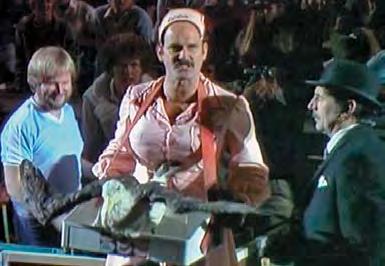
“I wrote Erik because I was disappointed by the original Icelandic fairy tales I was reading to Bill. I thought they’d be full of magic and dragons, and they aren’t. They’re all about feuds. Somebody goes and steals somebody’s cow, so the other person kills their cow and then the other person kills their daughter and it all escalates. We did a skit of Njal’s Saga in Monty Python called Njorl’s Saga, which was all about how Njorl never gets started on his adventures because it’s all about explaining how so-and-so married so-and-so and so-and-so married so-andso, which I must admit is a bit like what the tales are actually like.”
With all of these different strings to his career, how would he describe himself? “I’m just a lucky blighter; I’m able to do anything I like. Python opened up so many doors.” He sips his coffee and ponders on how things could have turned out differently back in the mid-1960s when he left Oxford, where he was a member of the renowned Revue, and was thinking about a career in television.
“I wrote to everyone and was accepted as a copywriter for East Anglia Television.
I was just about to go when Frank Muir’s office rang and said would I like to come in and have an interview. He was BBC Head of Comedy. I always wanted to ask him why he chose me. He said, ‘Come round, we’ll give you two desks, four telephones and two typewriters.’ I was there when they cooked up Till Death Us Do Part and The Frost Report, which John Cleese and Graham Chapman wrote for.”
Terry’s job also reunited him with fellow Revue performer Palin and eventually the Python team came together. “If I’d gone to East Anglia Television I’d have sunk without trace.”
ddly, one thing Jones doesn’t have time for these days is watching TV. There isn’t actually one in the house.
“We had one, but we didn’t really use it. It was just sitting in the garage, so I gave it to the dustman.” As a result, he’s not too up to speed on modern comedy, “I like Eddie Izzard, ►
he’s brilliant. I’m hoping he’ll play the headmaster in Absolutely Anything. And Anna and I both like Dylan Moran.”
He calls his wife up to be reminded of the other comedian he enjoys. “Casey someone? Oh, Louis CK.”
There’s sometimes a serious side to Terry’s prodigious output. “I’ve just made a documentary with my son’s film company Bill and Ben about the 2008 crash. I narrate it. It was funded by a Dutch risk-management company. They want to warn people that there’s going to be a disaster, that the economy is going to collapse again. I think they might be onto something the way house prices are going up. It’s just a bubble.”
With his love of history, would Jones have preferred to have lived in the past? What about Viking times? “Not at all,” he shudders. What about Chaucerian England? “If I’d lived then I’d have been
dead by the time I was 27! Life expectancy was fine if you lived a healthy life, but I had a burst appendix when I was 27 and it would have killed me. You have to be lucky. If I’d gone to East Anglia TV I don’t know where I’d be now.”
The 02 shows will no doubt renew interest in Monty Python. There’s already been talk of a US tour. “Everybody else agreed to do the show in America, but Mike Palin says he’s too busy…” Aren’t the Pythons quintessentially English? “Well, we’re popular in Japan so I don’t think so. Humour is pretty universal. We’re waiting to break into the Chinese market. I see no reason why not.” n
Monty Python Live (mostly) is at the O2 Arena on July 1–5, 15, 16 and 18–20. The Saga of Erik the Viking is published by Pavilion Books (£6.99).
We all like a bit of personal space from time to time, but there are some people down the years who have taken a hermit-like existence to extremes:
Józef Stawinoga (1920–2007): Józef (right) lived in a tent in the middle of a Wolverhampton ring road for over 40 years. Revered by local Sikhs and Hindus, he even got an honorary degree from Wolverhampton Polytechnic.
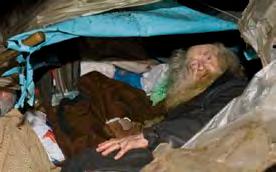
Valerio Ricetti (1898–1952): Legend has it that Valerio sought shelter in a cave while out walking in New South Wales, Australia—and liked it so much that he stayed for nearly 23 years, eventually adding a kitchen, chapel and terraced gardens.
Arthur Darwin (1879–1977): Arthur lived in Florida’s Everglades National Park for over 30 years—much to the chagrin of the authorities, which made strenuous efforts to evict him. (Arthur attended court hearings barefoot, which annoyed them even more.)






CONTAINS IBUPROFEN. ALWAYS READ THE LABEL.







Look out for more of your 100-word stories in upcoming issues—we’ll be running them throughout the year!
At last, the answer to the question everyone wants to know. Who took the prizes in our very-short-story competition?

Congratulations to everyone who took part in this year’s contest! We had thousands of entries and, once again, we were thrilled by the quality of your stories. What a creative and talented lot you are. You gave us just one problem—how to choose the winners. Usually, the RD magazine team gets on extremely well, but while judging this year’s stories we almost came to blows. We argued long into the night about plot twists, exquisite writing, emotional connections and imaginative storytelling, but here, after much debate, are our winners.
ADULt CAteGOrY winner
mOniqUe mUnrOe, 56
Our £1,000 prize goes to Monique from Dorset, who works in the voluntary sector
the KnittinG GrOUP
“Hurry up or we’ll be late,” Catherine’s mother hurried her out of the house. “And don’t forget these,” she added, grabbing her daughter’s wool and needles. They eventually reached their knitting group and settled down.
Catherine looked enviously at the other women. If only she could knit like them. How they managed to look around and chat without noticing what their fingers were doing was amazing. She concentrated hard on her simple stitches.
“Oh, I just can’t get this right.”
“Watch,” her mother nudged her.
Catherine looked up to see the head of another French aristocrat roll into the basket.
the JUDGes sAiD: A wonderfully realised story that creates an uncertain atmosphere even before you get to the gruesome twist. A worthy winner!
mOniqUe: It was talking to a friend about the knitting group she attends that gave me the idea for the story. I remembered how the ghoulish knitters would sit beside the guillotine and suddenly Catherine’s story was born.

ADULt CAteGOrY rUnner-UP
wALLY smith, 66
£100-worth of book tokens go to Wally, a retired civil servant from Berkshire
After the rAins fALL
I am Jumatu and my brother, Emiliu, says I am 11. Emiliu is 15 and can read, so he must be right. He says my birthday is in three months. He always says it is three months. Emiliu says I was born when heavy rains had fallen and it was two days later when the “guardos” took our father away with other men from our village. Emiliu says our father is probably dead. Three months is a long time, but when the rains finish I shall know to add one year. Then I can join the rebels like my brother.
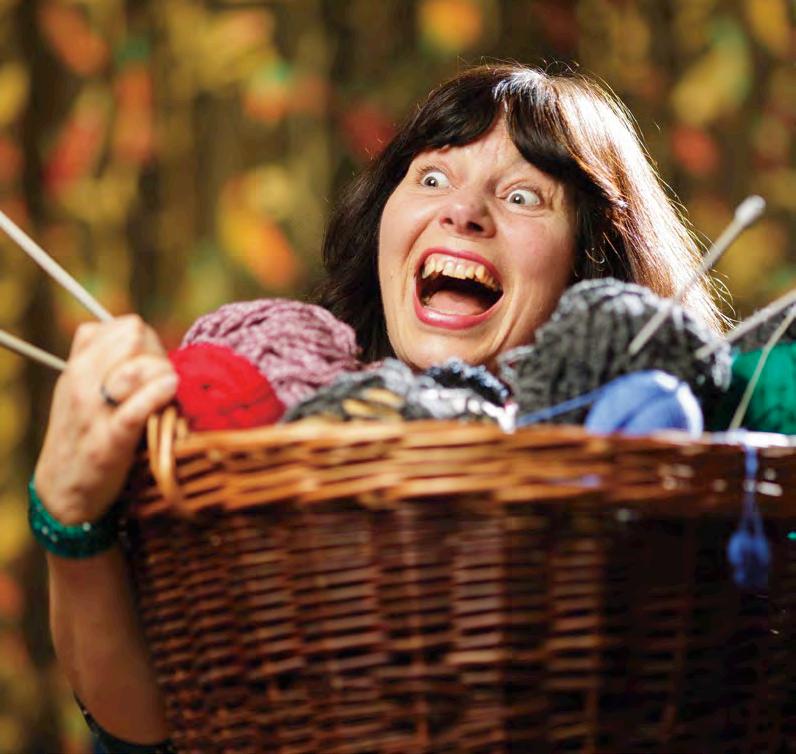
ADULt CAteGOrY rUnner-UP
JAne COOPer, 39
£100-worth of book tokens go to Jane, a freelance copywriter from Cheshire
In the dark, sometimes I think I see human faces. In the curtain, the rose that is an eye, the stem that is a mouth. In the wardrobe, the soft grain of the wood curving to imitate the shape of a head and a yawning mouth. I lie awake, waiting nervously for dawn, listening to the rhythm of my mother’s breathing as she sleeps soundly in the next room. A shadow momentarily flutters past the mirror by the door and I freeze. My heart pounds. In the dark, sometimes I think I see human faces. And sometimes I am right. ►

sChOOLs 12–18 CAteGOrY winner
eLLen BLOxhAm, 13 £500-worth of high-street vouchers go to Ellen, plus £500 to The Marlborough School, Woodstock, Oxford
Rock pooling is great when it’s stormy. Waves crashed against rocks drenching Lily and Ray’s faces.
“It’s quite rough” Lily bellowed. “Should we go?” Ignoring Lily, Ray ran towards the biggest pool.
“Come on Lily, its huge!” Grabbing at each rock, Lily stumbled.
“Wow, it’s amazing” Lily exclaimed, a big grin across her face. Turning, something shimmered in the pool, catching Lily’s attention.
“Ray, what’s underneath the seaweed?” Lily asked. Picking the object from the sea, scraping off the sand, she placed it on her finger. Lily stared at Ray, concerned and paused.
“I have worn this ring before, somewhere.”
the JUDGes sAiD: This intriguing story leaves you guessing—in an admirably clever way. Is it about two people out for a walk or something much more supernatural?
eLLen: The idea came from memories of being with my brother at the beach. We always used to explore rock pools and find different objects, and I thought it would be a good idea to bring those memories back. I was surprised and very proud that I’d won.
sChOOLs 12–18 CAteGOrY
sPeCiAL COmmenDAtiOn
AnD £75 tO:
eLLie PALmer, 16
Simon Langton Girls’ Grammar School, Canterbury, Kent
PerfeCtiOn
Sharp, smart, sophisticated. The quick tapping of heels. The neighbour smiled, warily. She may bite. Flawless nails skimmed along the zip of the pristine leather bag, removing a set of keys. The steel grey eyes stared, utterly focused.
A door opened, revealing a clean white house, light streaming in. She closed the door. The room went dark. She stared at the hall mirror. Perfection stared back. The papers landed on the floor. The flawless nails tore at the beautiful hair and water rushed from her eyes to wash away the mask of lies. Sharp, smart, sophisticated. False, forlorn, fearful. Perfection.
hUw tUrnBULL, 14
Hereford Cathedral School, Herefordshire
A DAnCe with the BArOn The baron walked down the stairs. He was wearing his finest suit. He grinned a devilish grin and, with one quick wink and a tip of his hat, he made the whole crowd move. I felt them disperse around me; was it to be my turn so soon? As he took my hand and led me gently to the dance, I knew that I had sealed my fate, to dance the Macabre. I knew this would be my last dance as we spun away the night, for my dance was with Baron Samedi and it was the dance of death. ►
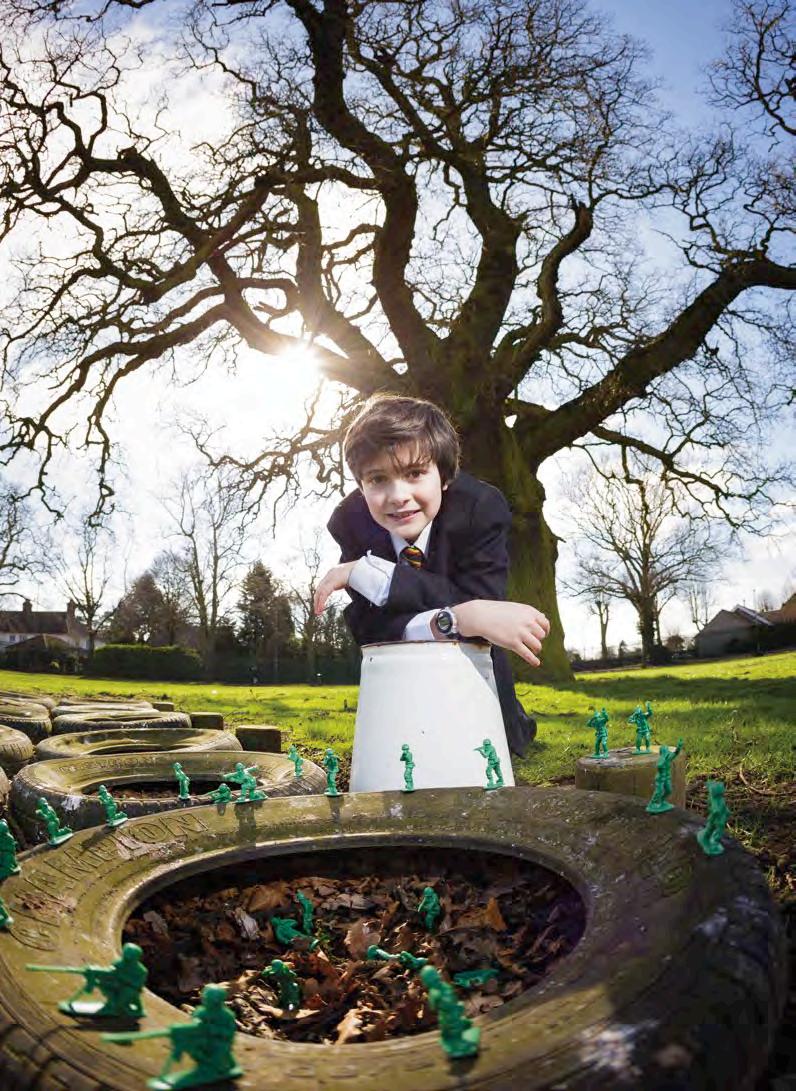
sChOOLs UnDer-12 winner
rOBert hOBsOn, 11
£500 of high-street vouchers go to Robert, plus £500 to Harris School, Rugby, Warwickshire
ArmY sOLDiers
Army soldiers live in a bucket; ready for action when you get them out to man the planes, tanks and helicopters and get ready to defeat the sinful, callous toys causing destruction to all of civilization. The army kicks in moving forward for battle. Infantry move out with long trip wires ready for action, the helicopters with men ready to jump. The main battle formation of the front line is in a battle-ready stance with their guns loaded, their fingers on the triggers, parachutists right at the edge…
“Dinner time”—the soldiers are thrown back into their bucket. Battle over.
the JUDGes sAiD: In just a few lines, Robert injects energy and detail into his story, transforming his toy soldiers into a mighty fighting force. Very imaginative.
rOBert: Wow, just wow! Those are my initial thoughts, anyway. I was playing with my soldiers and got slightly bored, so I decided to take a break and write a bit. I came up with the idea and a while later I thought of the punchline. Then the story developed, and bit by bit it came together. I wrapped it up and sent it off.
A month or so later, I won!
sChOOLs UnDer-12
sPeCiAL COmmenDAtiOn
AnD £75 tO:
GrACie mUrPhY, 11
The Weald School, Billingshurst, West Sussex
the PrisOner
Another boring day, with the same boring routine. I really dislike my job. I never meet anyone interesting, just messed-up men. Every day I get up before the first hint of dawn, get ready and go to work: a guard at the local prison. It is dark and dingy, and smells of regret and guilt. The lights are always dimmed.
I guard a prisoner, who’s committed some crime. A scruffy troublemaker, usual features of a convict. I am fed up with his little ways. Just another nobody who’s facing a death penalty. No one will mourn for Jesus Christ.
Wisborough Green Primary School, Billingshurst, West Sussex
where’s DAPhne?
She was all alone and scared; I had to do something about it. The poor lonely, lost duckling was unsure about anything. I picked her up and she was tiny compared to my hands. I looked in her eyes and I could tell that she was frightened, helpless and exhausted. Every day I made sure she was fed and had clean water to swim in. When she got a little bigger I put her in our pond, and there she stayed happily swimming around quacking. Then one day there was nothing, not even a quack or splash. She was gone… n
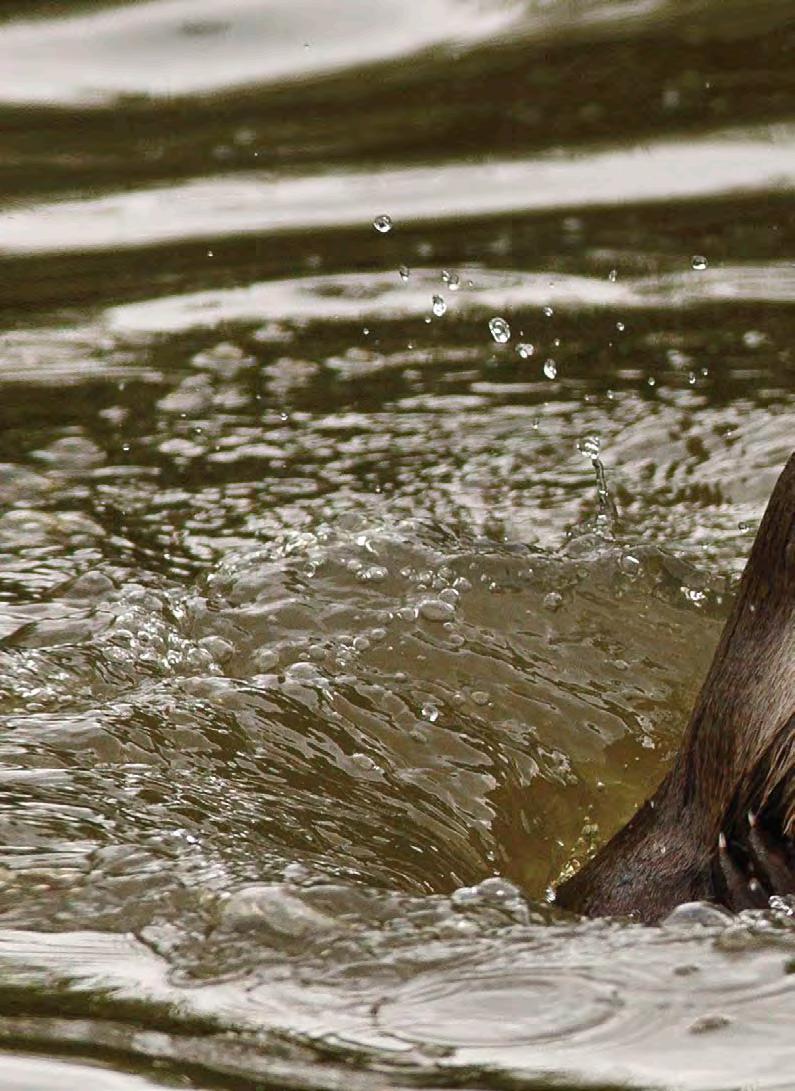
Why not take a walk on the wild side this month with our pick of Britain’s best animal attractions
By simon Hemelryk
Proving that homegrown animals can be as fascinating as those from the other side of the world, the British Wildlife Centre is dedicated to preserving and promoting the animals that hail from our shores.
“We’ve got everything from harvest mice to Britain’s largest land mammal, the red deer, all in natural habitats, as they would be in the wild,” says spokesperson Liza Lipscombe.
Among the 40 or so other species at the site— which used to be a dairy farm—are stoats, otters, pine martens, water voles, barn owls and adders. Though native, one rarely gets to spot many of the creatures in the wild, because they’re nocturnal, shy or rare.
“We’ve also recently had two litters of Scottish wildcats born as part of a reintroduction-to-the-wild programme, which was a nice surprise as they’re teetering on the edge of extinction,” says Liza. Visit britishwildlifecentre. co.uk for details
Home to more than 1,000 animals, this attraction in the middle of the Scottish capital has two types of animals you won’t find anywhere else in the UK.
Male koalas Goonaroo and Yabbra have been at the zoo for seven years, and were joined just over a year ago by a female called Alinga. Unsurprisingly, she became pregnant shortly after, giving birth to a joey called Yooranah.
With a proud tradition of innovation—the zoo was the first in the world to breed king penguins in captivity back in 1919—Edinburgh also boasts Britain’s only giant pandas. The breeding pair, Tian Tian and Yang Guang, did their best to produce some offspring last year, but the hopes of a first panda cub to be born in the UK faded when Tian Tian lost her baby late in her pregnancy.
On a lighter note, the zoo also runs adults-only nights, where over-18s can roam the zoo without candyflosscovered kids pestering them. You can even buy drinks —but, says CEO Chris West, “We don’t allow crazy drunkenness. It would upset the animals. In fact, in the absence of children, adults tend to revert to a childlike wonder at the animals, reconnecting with nature.”
Visit edinburghzoo.org.uk for details

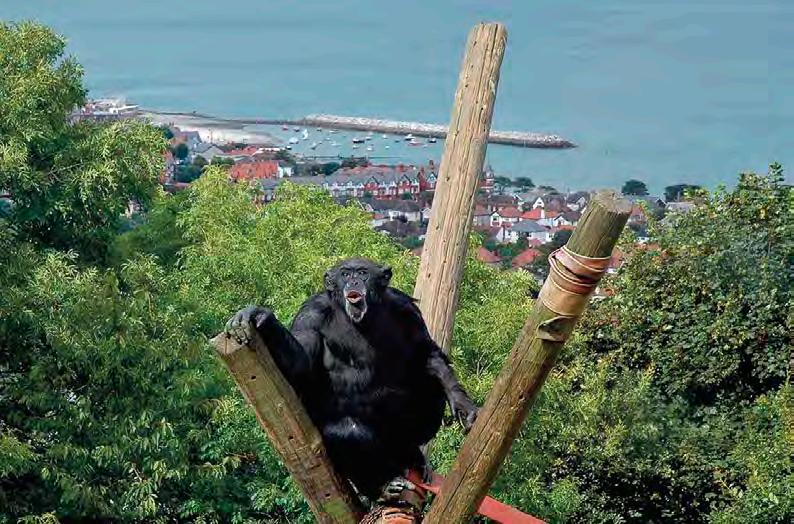
Although this is a relatively small, intimate zoo, it has a rather special USP—everything around it.
“We’re perched high on a hill at the edge of the Snowdon range,” says marketing officer Jamie Toffrey. “There are views—360 degrees in places—across the sea, mountains and down the Conwy Valley. In other zoos, you’re looking at the animals and maybe a perimeter wall. Here, there’s always some kind of other backdrop.”
The zoo has some fabulous exhibits too, including Sumatran tigers (right), sea lions and snow leopards. And in the summer, the penguins do parades led by the keeper. “Occasionally, we have snow up here when it’s clear down in the bay. The penguins don’t mind. They just carry on as normal, as do the European bears. The chimps aren’t so keen, though, but all the animals have somewhere warm inside!” Visit welshmountainzoo.org for details

It’s already been the busiest year ever for this 40-acre rescue centre on the banks of the Helford Estuary, dedicated to helping injured or lost seal pups and releasing most of them back into the wild.
“We’ve rescued more than 60 pups since January,” says care supervisor Tamara Cooper. “A lot of the injuries, such as broken jaws and puncture wounds, are probably due to storm damage, and the bad weather has had other effects too—there have been ten abandoned pups.”
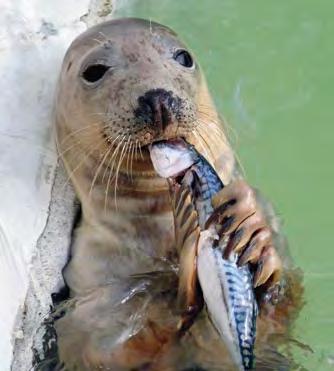
The public can see pups at various stages of rehabilitation as they play in the pools, and you can even go behind the scenes in the seal hospital. Since local resident Ken Jones started the sanctuary in 1958, it’s helped thousands of animals, with numerous heart-warming success stories.
“Gemini, one of the seals that came in recently, had taken such a blow that her lower jaw was shattered and six of her teeth came out. But our vet wired her jaw up and within hours she was back feeding herself. Soon, she’ll be released back into the sea.”
The sanctuary also has penguins, sea lions and two otters called Starsky and Hutch. Go to visitsealife.com/gweek for details
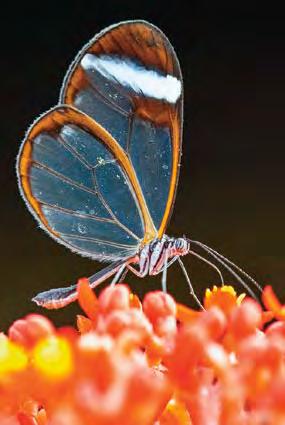
A combination of tropical blossoms, fish-filled pools, waterfalls and more than 1,500 free-flying butterflies make this the largest attraction of its kind in the UK.
Species flapping past your nose include the metallic-looking Blue Morpho, which is as big as a side plate, and the Owl Butterfly, which is almost the size of a dinner plate. The farm breeds its own butterflies, or gets them from conservation projects in tropical countries such as Thailand, Kenya, Costa Rica and Surinam—raising butterflies is a source of income in many rainforest communities.
As well as all the fluttering, the Insect City section is one of the biggest displays of live insects in the world.
Visit butterflyfarm.co.uk for details
international centre for birds of prey
Newent, Gloucestershire

One hundred and twenty rats (cut in half and gutted), eight kilos of mice, 8,400 cockerels…the monthly catering plan at what’s probably the largest dedicated birds-of-prey centre in the world leaves a lot to be desired. Happily, though, it’s mainly for its 250 or so winged inhabitants—there’s a very nice cafe for human visitors.
But the centre’s big selling point is watching its magnificent birds do what they do best. “We try to make sure that no one leaves without seeing them fly,” says director Jemima Parry-Jones. “We
have an indoor centre where kites will dart through the air catching bits of meat. But we only allow most birds to fly outside—particularly the peregrine falcons. They can reach 60mph and have very poor brakes.”
Jemima, whose father Phillip Glasier opened the centre in 1967, helps with conservation projects around the world, such as a recent breeding programme for rare vultures in India. Centre staff have also been asked to clear factories of small birds, drive starlings out of the city of Bath and remove ducks from rice fields in Australia. see icbp.org for details
and
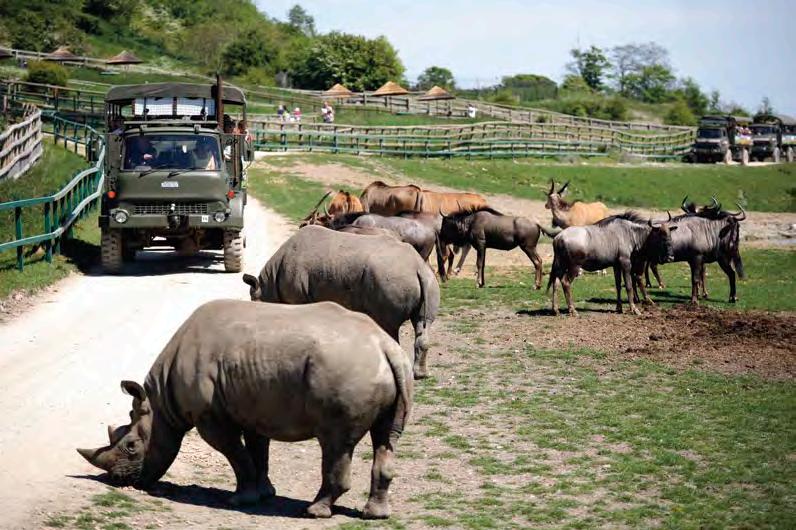
Though similar attractions such as Whipsnade and Longleat may be more famous, nowhere offers a visitor experience like Port Lympne.
You can enjoy animal “encounters” with gorillas, tigers, primates, rhinos, giraffes and bearcats, getting up close to or even entering the enclosures of the animals during feeding time. Dusk safaris take you out into the wilds of the African Experience section to enjoy a buffet meal, while watching the animals prepare for nightfall. You can also book
a personal safari where an expert guide takes you and up to eight companions around the various animal compounds in an open-topped Land Rover.
Adults and children alike can be a keeper for a day, participating in cleaning, health checks and making enrichment toys. And if you really want an immersive experience, you can stay overnight in luxury tents in the middle of the park, waking up to the sight of giraffes a few feet away and some rather nice breakfasts. Visit aspinall foundation.org/ port-lympne for details

It’s not often you visit a wildlife attraction where half the animals can talk to you. And with more than 100 species at the Parrot Zoo, they’ll probably have a few different accents too.
Founded in 2003 by Steve Nichols, who’d spent the previous decade collecting rescue birds and needed somewhere to put them, the attraction, a registered charity, is now the largest collection of parrots in the UK.
It’s also home to lemurs, lizards and an eccentric meerkat enclosure, styled like a Wild West frontier town. “We tell visitors that a group of meerkats left Africa to find riches, and while some went to Russia and found fame—you’ll have heard of Uncle Sergei—the others settled in the US,” says Steve.
Even the zoo’s patron is a left-field choice: Derren Brown. “He’s a real animal lover and has supported us for nine years. The grand plan is that one day he’ll hypnotise everyone in the UK into supporting our work!”


Visit parrotzoo.com for details
Wareham, Dorset
“First and foremost, this is a rescue centre,” says director Dr Alison Cronin. “Our 250 or more monkeys and apes are here mainly as a result of suffering abuse or neglect. Opening the park pays for our work.”
The centre, which is the subject of Animal Planet’s Monkey Life series, has inhabitants from around the world, including Spanish chimps previously made to dress up to amuse tourists, orphan African monkeys who lost their families to poachers and animals once used in laboratory testing. The in-house medical teams and behaviouralists provide some of the best treatment available, and all the primates have large, natural enclosures.
“They’re as fascinated by looking at visitors as we are by looking at them,” says Dr Cronin. “There’s a great video on our website of a chimp called Rodders playing peek-a-boo with a little boy.” n Visit monkeyworld.org for details
If you’ve had a close encounter of the wild kind that we haven’t mentioned here, we’d love to hear about it. Send us an email—with a picture if possible —to theeditor@ readersdigest.co.uk.
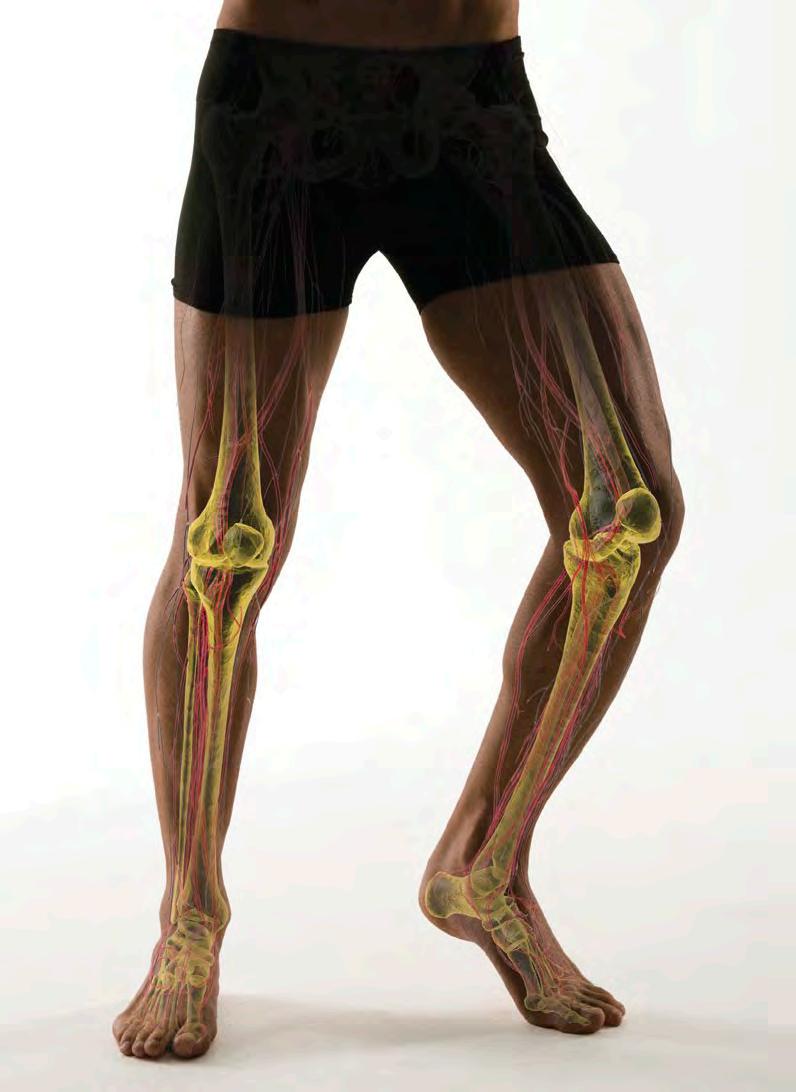
I’d love you to lose just ten per cent of your we I ght. It would I mprove my arthr I t I s
got an achy twinge? a limp? out-and-out arthritis? well, why don’t you try to live...
It’s cosy beneath these blankets, but I want out. I am achy and inflamed, brittle from a motionless night. I wait for The Body to register my familiar morning stiffness. He moans and rolls over, not quite ready to face the day. C’mon, get up already so we can work out these kinks.
He flings his feet over the side of the bed and plants them on the floor. I’m not going to lie: straightening myself out under all 15 stone of him takes some serious grit. I brace myself for the load. My upstairs neighbour, the thigh muscle, contracts and yanks the quadriceps tendon, which pulls on my kneecap to make the leg extend. I’m a hinge, with pulleys that bend and straighten me.
The other knee sniggers. He’s not in as bad a shape as I am and thinks I’ve got the martyr routine down pat. The quads and hamstrings like to joke that I’m their little marionette. Yeah, real knee-slapper, guys.
As he gets dressed, The Body flips on TV to catch replays from last night’s game. Oh, dear. What’s this? One of his team’s players suffered an anterior cruciate ligament tear? Side-tackled while all
►
his weight was on one foot. Body, cover your eyes, for the love of God!
Why does he make me watch this? He’s wincing, too, because I suffered that same injury about 20 years ago. It still haunts us.
The Body had been out of college for ten years and had let all of us (muscles, ligaments, and tendons) go to pot. Not that I blame him. You know the drill: sit all day at a desk, meet friends for happy hour. Who has time for exercise? Then, one weekend, he joined a football match. Just ran right out there like the student athlete he no longer was—no warming up, no taking it easy—and snap! Tore my cruciate ligament. It’s the string that runs through my centre, connecting the thighbone to the shinbone, and it keeps me from wobbling all over the place. Worst day of my life. I heard a pop and felt a wave of excruciating pain wash over me as The Body fell to the ground.
each other, may not ever fully recover. Finally, The Body decides to switch the TV to the weather forecast. The meteorologist is calling for fair skies. Yeah, right—I know better. I get extra achy just before it rains, and I’m throbbing. The Body’s doctor says he hears that complaint all the time but isn’t quite sure why the pain worsens. His best guess: when air pressure drops, my already inflamed joint swells even more, irritating the nerves. Before he limps out the door, The Body grabs his umbrella to be safe. Good call, my man.
l ately, the doc tor has been say I ng that eventually the b ody w I ll need to—gulp— replace me
Make Me saD
That’s the reason I’m so craggy before my time (I’m only 49). Surgery and physiotherapy did get me working perfectly again. But ligament tears leave us knees with a 50–50 chance of getting arthritis within ten to 20 years. I wouldn’t take those odds to Las Vegas. My cartilage, the protective tissue on the ends of bones that keeps them from grinding against
The Body pulls into a drive-through on the way to work to get coffee. Thank goodness he’s stopped having those sausage, egg and cheese breakfast sandwiches. With all this additional weight he’s put on, I’m like a toothpick supporting an anvil. Not only is The Body’s belly crippling me, it’s also putting my better half, the “good knee”, at serious risk for arthritis. My partner is almost three times more likely to get it, due to The Body’s extra-large size.
Happily, the scales have been on a downward trend lately. This month, The Body has lost five pounds, which has taken 20 pounds of stress off me.
He shuffles into the office. Man, is it cramped under this desk. The Body feels my discomfort and swallows a couple of ibuprofen. They’ll help quell
the pain for a few hours, but, alas, they’re not a permanent solution. Lately, the doctor has been saying that eventually The Body will need to— gulp—replace me.
Actually, it sounds worse than it is. I’ll say goodbye to my worn-out cartilage. My bones will be resurfaced and plated with metal. True, I’ll barely recognise myself, and the other knee will probably start calling me The Terminator or some nonsense. But what’s The Body’s alternative? Hobble around for the rest of his life? That’s not much fun for me either.
can We GeT soMe exercise, Then?
Ooh, it’s his wife on the phone. We’re going to the gym after work—hurrah!
As we head inside, The Body sees his wife sprinting towards him in heels. Ouch. Glad I’m not one of her knees. She didn’t grab an umbrella and doesn’t want to get drenched. Hey, lady, worry about your joints, not a few raindrops. High heels are a torture device for us, and women are more prone to knee issues than men are to begin with. But she’s young and fit, which will protect her…for now.
Not that I’m in love with The Body’s “comfy” trainers. “Stability athletic shoes” sound good, but the more rigid the shoes are, the more stress they put on me. I wish he’d swap them for flat, flexible shoes with soles that let your feet bend.
The Body looks longingly towards the five-a-side football pitch. There are still plenty of activities he can do—
biking, swimming, t’ai chi…old-people exercise, he calls it. But I love it all because it keeps me from getting worn and rusty. It used to be that if I got injured, they’d put me in a cast. Boy, was that dumb. In order to regenerate, cartilage needs to move and endure weight-bearing activity. The Body takes a spin on the elliptical. Woo-wee! I feel better than I have in days. I can’t wait for the weight machines. Strong muscles support and stabilise my joint.
Back at home, The Body’s wife whips up a quick dinner of salmon, sweet potatoes and broccoli. I’m pumped. The Body doesn’t think much about how his diet affects me, but it’s important. I’ve got low-grade inflammation and fatty fish such as salmon may slow down my disease. See, inflammation is the body’s defence against injury. It causes swelling and pain. That’s great when there’s an actual enemy. But with chronic inflammation, the body keeps fighting even when there’s no threat. And all that heavy artillery can contribute to my arthritis.
The Body yawns and I’m relieved. He loves to burn the midnight oil and doesn’t realise that sleep can ease my pain. I think tonight’s gym session knackered him out. The Body is being sweet to me tonight—sleeping on his side with a pillow wedged between me and the other knee. He prefers snoozing on his belly, but I like this position best. And if I’m happy, The Body can get a good night’s rest. Now, that’s what I call a real joint effort. n

You know that awful feeling you get after crafting the perfect plan, only to watch it unravel?
by andy simmons



To the cheers of bird lovers everywhere, conservationists reintroduced white-tailed sea eagles to east Scotland, where they haven’t lived for 200 years. As a safeguard for the eagles, they were placed on the protected-species list.
These protected birds now have free rein to attack livestock and civilians alike—an activity they seem very much to enjoy and, apparently, are quite good at.
Source: telegraph.co.uk
When Lorean Simmons locked herself out of her Pittsburgh home, she sought help from the authorities.

In an effort to rehabilitate inmates, HMP Isis in south London offers adult-education classes to its convicts.

One prisoner, Nicholas Webber, used his class time in an IT course to hack the prison’s computer system. So why was Webber imprisoned in the first place? Oh, yes, for hacking computers.
Source: cnet.com
First, she set her house on fire. Then she called the emergency services, expecting firefighters to put out the fire and unlock her door. As planned, the fire service responded, but so did the police, who charged Simmons with reckless endangerment.
Source: wtae.com
A man from White Rock, British Columbia, was so smitten with his lady that he booked a weekend holiday for just the two of them.

His wife found out. After throwing all his belongings into the garden, she advertised a “Lying Cheating Sale” on Craigslist.
“I want the house empty on Monday when he returns,” her ad stated. Included in the sale were his favourite red-leather recliner and “lots of tools, which he didn’t have a clue how to use”.
Source: theprovince.com
Zoo life is a dull life. So in an effort to liven things up for their chimp Gina, zookeepers in Seville, Spain, installed a TV set in her cage and then taught the little simian how to use the remote. Gina took to it quickly!

During the last US election, Roxanne Rubin, a casino worker in Las Vegas, was irked that people weren’t taking voter fraud more seriously. So she set out to prove that it was a real problem.
dIdn’T Work!
While channel surfing, Gina discovered the porn channel, to which she’s now addicted.
Source: gawker.com
Johns Hopkins University professor Peter Froehlich announced to the students in his computer-programming class that their final exams would be graded on a curve. That meant that the highest score would automatically be 100 per cent, and everybody else would get a percentage relative to that grade.
dIdn’T Work!
His students refused to take the test, which meant they all got a zero, which meant they all got the lowest and highest grade, which, in turn, meant they all received an A for the exam.
Source: freakonomics.com
dIdn’T Work!
She was caught attempting to vote twice and arrested on charges of voter fraud.
Source: huffingtonpost.com


Day is a time-honoured tradition that allows children to experience the business world while watching their parents ply their trade. With that in mind, one father brought his young son along with him on a job.

His job happened to be robbing a pet trade fair. He was caught soon after, in part because of what he’d left behind—his son.
Source: WISN-TV

In order to protect its brand, Google asked the Swedish Language Council not to give its blessing to a new Swedish word: ogooglebar, meaning “ungoogleable”. The company argued that the term, which refers to one’s inability to find something using any search engine— not just Google’s—tramples on its trademark and, thus, the council should not aid in popularising it. The council begrudgingly agreed.
All the publicity and bad press garnered by the case has caused a flood of Swedes to go online to look up ogooglebar.
Source: pcmag.com
Christopher Lowcock was under house arrest in Rochdale on drug and weapons charges. To make sure he wouldn’t violate his curfew, police attached an electronic tag to his leg.
Police attached the tag to Lowcock’s prosthetic leg, which Lowcock easily removed in order to enjoy an evening out on the town.
Source: BBC


Last season, to show appreciation for their long-suffering fan base, the lowly American football team Houston Astros invited supporters to come to their ground early one day to mingle with former team stars Jose Cruz and Joe Niekro.
Joe Niekro was unable to attend due to a death in the family. His own. In 2006.
Source: Sports Illustrated
After 15 months on the run and with his conscience weighing on him, a Swedish murder suspect decided to turn himself in to the police.
When he arrived at the police station shortly after 6pm, cops told him to go away—they were closed for the day. “Closed?” he shouted back at the police. “I’m suspected of murder and I’m a wanted man. You really want to get hold of me.” Obviously not as badly as he’d thought, because officers directed him to colleagues at another police station, who, they assured him, would be happy to apprehend him. n
Source: thelocal.se


…the smell of wet plane-tree leaves on london pavements. Also, walking in crocodile lines with my young school friends, aged five.
…a great sense of order in our home life. I was an only child. Dad came home exactly in time to watch the BBC six o’clock news, and you’d approach him at your peril.
…waking up on the other side of the north sea and looking through the porthole of the
boat at a strange and exotic place— the Hook of Holland. My parents were both diplomats and when I was six we moved to the Netherlands for a couple of years. When we drove off the ferry (the Avalon—I’ve got a great memory for completely useless details), all the place names had lots of Js and Ks. It was such a thrill to be on the Continent. At the train station, I was fascinated by the realisation that you could travel to different countries by train. These were the days before the Channel Tunnel, of course, so the thought of being

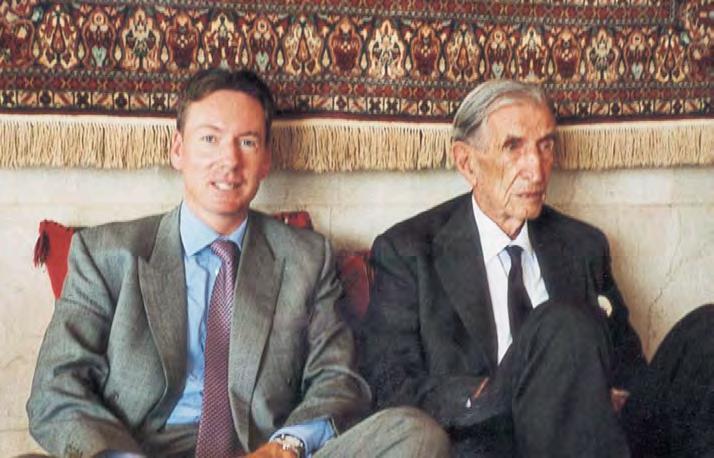
transported effortlessly to Budapest from the Netherlands was a really big deal.
…meeting sir wilfred thesiger, the veteran arabian explorer. My mother dragged me to tea with him— he was a family friend—when I was 16. My first impression was that this crusty gentleman in a three-piece suit wasn’t in the slightest bit exotic, but the clues to his adventures were all round his Chelsea flat. I become mesmerised: wizened old gourds, camel saddles, curved daggers and wonderful black-and-white photos told of far-off places that roused my curiosity about the Arab world. Thesiger railed that the old Arab world was “gone— ruined by oil”. Yet it seemed to me that if the Arabs had oil, there was always going to be a job for someone who spoke Arabic.
…spending a year in egypt. It was part of my Islamic Studies at Exeter University. My father had encouraged me
Sir Wilfred Thesiger, who sparked his love of the Arab world
to keep a diary when I was at school and, although it was pretty dull in those days— “it rained today. I was sick after games”—I’d become a prolific diary writer by the time I found myself in Cairo. I’d seek out a spitand-sawdust cafe in the Islamic Quarter and write and draw what was around me. I loved doing that—sketches of the bald-headed butcher puffing on his shisha pipe alongside thoughts on my day. The diaries were invaluable when I was writing [my autobiography] Blood and Sand, although I left out a lot of the idiotic stuff—my endless unrequited love for waitresses, for example.
…sleeping on a deserted beach in sharm el-sheikh. I’d hitchhiked down there on the back of a military truck. It was October 1982, the year Israel handed back the last of Sinai to Egypt.
Sharm el-Sheikh was completely different to what it is now—unrecognisable. There was one tiny hotel up a hill and nothing else. My friend and I put down our sleeping bags and, before I knew it, I seemed to be in the middle of a strange dream, with army chanting songs filling my head. When I woke up, there indeed was the muscled 82nd Airborne Division of the US army on their morning jog along the beach. They were part of the international observer force employed to keep the peace—it was all rather surreal.
…ramadan in the middle east is a magical time. I have a lot of respect for so many aspects of Islam. One of the things I admired was the wonderful sense of community, the good deeds and generosity that pervade that month of fasting and feasting. You don’t want to be around in the morning when everyone is grumpy and half asleep, but after the Iftar at eight or nine in the evening when everyone starts filing out onto the streets, happy and replete, it’s like Christmas every day. To have been part of that, not as a journalist but as someone actually living there, made me feel very privileged.
…the wilderness years. After university, I found myself selling perfume in Selfridges for a few weeks. Standing there with a smile on my face all day was exhausting. Although that wasn’t the hardest job I’ve had—to finance my year off before university, I’d worked at a

On a business trip to Manama, Bahrain, in 1989, when Frank was working as an investment banker
brick-and-tile factory in Hampshire, cycling there in the dark in the freezing cold before dawn. My job was to roll the newly made saturated clay bricks in sand to give them that gritty texture. It exercised pectoral muscles I didn’t know existed, and at the end of each day my chest was on fire. I earned £55 a week and my dad took some of that off me for my board and lodging.
…manhattan was fantastically liberating. I was there on a corporatefinance course in 1987. Everything was
“After university, I found myself selling perfume in Selfridges”
In the Mustang in Bahrain— taking a break from speeding at 135mph; (below) working for the BBC with the Cairo bureau team

big—people thought big, the Trump tower had just gone up and I was young and ready to party. There was an enormous book, The GAAP Guide, on “the generally accepted accounting principles” that we were supposed to study, but my roommates and I made a pact never to open it. Instead, we devised an excellent game in which we had to keep the book in the air for as long as possible using only our elbows, knees or feet.

…my beloved five-litre convertible ford mustang. It was the perfect car for a young investment banker living in Bahrain, where I ran the Flemings office for more than three years. One day, the car caught fire; the gearbox overheated and the fire brigade had to put out the flames. But the Mustang could do 135mph and I did get busted a few times
for speeding on my way to work. Bahrain, such a tiny pinprick of a country, was a very special place back then. Dialects and languages changed from corner to corner. It’s very sad that the country has been wracked with so much unhappiness since the troubles kicked off there in 2011.
…my early days at the bbc.
Leaving banking at 34 was a difficult decision but I’d grown bored and yearned to do something more exciting. Early on, ►
I was working a night shift for a BBC World Service programme, greeting the guests. It was only three weeks since I’d been at a banking conference. One of the guests happened to have been at the conference and recognised me, despite my scruffy clothes and unshaven face. He looked very anxious. ”My God, Frank! Are you all right? Do you need help?” But I replied I’d never been happier. He wasn’t the only one who thought I must have been having a mid-life crisis.

…being offered the Job of bbc security correspondent in 2002. After five years, including time as bureau chief in Cairo and reporting all over the Middle East, it was a great opportunity for me. If I had an agenda at that time, it was to cut through some of the bigotry that came after 9/11—a good journalist should report all sides of the story.
…hearing my screams of unspeakable pain when those six bullets were fired into me by Islamist gunmen on the streets of Riyadh in June 2004. I sounded like an animal. My cameraman Simon Cumbers was killed outright. I lay there bleeding and screaming, but nobody helped me for a good half an hour. There’s a shocking photo of me with people and the police nearby with their backs turned, hands on hips. The most charitable explanation is that a lot of the residents in that area probably thought that any Westerner in their streets was an Israeli spy or certainly
an infidel, and shouldn’t have been there. But those people aren’t typical Saudis. Early on after my injuries I decided I wouldn’t become prejudiced against a whole race of people or a religion—the outpouring of support I had from Muslims both in Britain and the Middle East was huge.
…being in hospital, unable to feel anything from the waist down. Even today, the pain from my many injuries keeps me awake at night, but I can at least feel if I scratch above the knee. Below the knee, nothing—like a line drawn in the sand.
…realising that our house was no longer a place i could live with my broken body. On a day visit from hospital, I was wheeled up to the house, supported by my wife Amanda and my two girls. Neighbours peered out of their windows as I approached the door I’d last walked out of with a rucksack over my shoulder.
…standing face to face with my sovereign. I insisted on wearing calipers when I received my OBE in
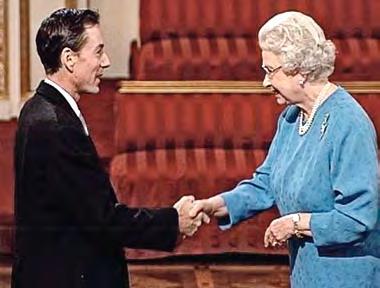
2005, though I think the Palace officials were worried I was going to collapse and wanted me safe in my wheelchair. I try to avoid situations that remind me of the bleak wall of disability. That day I was more pig-headed and determined than ever.
…returning to saudi arabia last year for the first time since the shootings. I went to the intensive-care room in the King Faisal hospital where I would have died if it hadn’t been for the tremendous team led by trauma surgeon Dr Peter Bautz. The memories flooded back of how very unsafe I felt there then, as though the people looking into my room were coming to finish me off. After 25 years of wonderful hospitality and warmth in the Middle East, it had been a huge shock.
…flying in a blackhawk helicopter over the yemeni borders and seeing the amazing mountains I’d once walked all over. In a

Meeting the Queen as he gets his OBE in 2005, and revisiting the Saudi hospital, where he was treated
sheep market in Najran, I thought I heard gunfire and said to myself, If this is another attack I’m really dumb to have got into this situation again. Thank God, it was just a truck backfiring. n As told to Caroline Hutton
The tenth-anniversary edition of Frank Gardner’s autobiography Blood and Sand (£9.99) is out this month.
I had to share with you this sign I saw outside a local pub. It just shows the hidden talent that alcohol can bring out! Many thanks to Lee Hall from Kent for sending this in


New drugs are the latest weapon in the fight against this devastating disease
From the start, Olivier Ameisen was an anxious child. Even simple things, like being given his own railway ticket to hold, caused him to worry until it was safely in the conductor’s hands. Anxiety became a part of his life as he grew up, entered medical school and, in 1983, at the age of 30, moved from his native France to New York. Although he became a successful cardiologist, he often felt like a bundle of raw nerves,
especially in social situations. That is, until he discovered that a few shots of Scotch settled him down and made him feel expansive, lucid and at ease.
When he changed jobs after turning 40, Oliver’s anxiety worsened. His social drinking soon turned into fully fledged alcoholism, damaging ties with family and friends, and causing him countless emergency trips to hospital. He attempted recovery at Alcoholics Anonymous, attended five different rehabilitation centres and tried medication, all without success.
The cycle continued when he moved back to France in 1999. Then, two years later, Ameisen, 48, read a newspaper article about a drug, baclofen, that had helped with cravings in a cocaine addict who’d been taking the medicine for leg spasms similar to ones that had bothered Ameisen for years.
He began to treat his own alcoholism with baclofen—at first, under the guise of calming his leg spasms. The drug suppressed his desire to drink and also suppressed anxiety. He chronicled his addiction experience and successful recovery in his 2008 book Le Dernier Verre [published in English as The End of My Addiction: How One Man Cured Himself of Alcoholism].
Afterwards, Ameisen worked to help others to end their addiction, until

last July, when his life was tragically cut short at 60; a family announcement cited a heart attack as the cause. In an interview shortly before his death, Ameisen told Reader’s Digest , “Ever since I’ve been on baclofen I can say that I’ve had terrible days. But my days are bearable. The beauty is you lead a manageable life.”
Days that are manageable without alcohol is something many people— as many as 11 million in Europe, according to one report—wish for, but often cannot find. “It’s estimated in the EU about 5.4 per cent of men and 1.4 per cent of all women are alcohol-dependent,” says Dr Lars Møller, a substance abuse expert at the World Health Organisation’s Regional Office for Europe. This means they cannot live a normal life because of their drinking.
But those numbers are probably an underestimate, he says. As many as 92 per cent of people who are alcoholdependent don’t seek help, according to one estimate, and those who try to get clean often don’t manage the first—or, like Ameisen, the second, third, or fourth—time they try.
Studies have found a wide range of success rates for alcoholism treatments,
“While theoretically abstinence may be the right approach, it’s not working for the majority”
—andreas eggert
depending on the method used and whether or not participants are followed up for several months or several years. Between 20 to 50 per cent are sober in the short term after treatment, but most people relapse at least once. At the same time, advances in treating alcohol dependence have been painfully slow.
The most familiar treatments are still the oldest ones: Alcoholics Anonymous was founded in 1938; the principles that make up the “Minnesota Model”, used widely in rehabilitation programmes, were pioneered in 1949 at the Hazelden Centre in Minnesota. Disulfiram (brand name Antabuse), which causes headache, nausea and other issues if people drink while taking it, has been around more than 60 years.
None has proved strong enough to defeat once and for all the powerful cravings and rewards that are part of addiction.
Alcohol or other addictive drugs cause the user to reach a euphoric state, or offer relief from a psychological issue, such as anxiety. With frequent use, the brain becomes accustomed to the substance, and the person cannot function well or does not feel right without it. This understanding has led in recent decades to the acknowledgement that alcohol dependence, is, in fact, a disease, and has accelerated the search for an effective cure.
In the past 20 years, many of the newest treatments for alcoholism have had one thing in common: a prescription. Drugs that limit alcohol’s effect on the brain are some of the most widely available. Naltrexone, which came on the market in 1995, is taken daily as a pill ►
“I entered rehAb”
Michael McAndrews, 47, Glasgow, sober for 21 years

I was brought up in an alcoholic household. That was the lifestyle I was used to. I just fell into it. I got caught up in low-level crime and was arrested for being drunk. I borrowed money from loan sharks to fund my alcohol habit—but I couldn’t pay it back. At 23, I went to London to escape them. I ended up on the streets. I was homeless for the best part of two years.
Then my father died when I was almost 25. I went back to Glasgow, and back on to the streets. But it was too cold, so I took refuge in a day centre. The people there gave me the chance to go into rehab and I decided to give it a go. Three days on, I found myself at Castle Craig [Addiction Centre].
I took part in the programme, looked at why I’d ended up where I had and explored routes for dealing with my old ways. I was in the clinic for six months. 18 months later, and sober, I found myself in New York. I’d won first prize in a raffle. I remember standing at the top of the World Trade Centre—a year and a half sober—and thinking, Now you can do anything. As long as you stay sober, anything’s possible.
Back in Scotland I now work at Castle Craig to help others get their lives back on track. As told to Elizabeth Adlam
(or as a monthly injection in the US and Russia) to block the euphoric effect of alcohol. Another drug, acamprosate, has been available in Europe for more than 30 years, and reduces cravings for alcohol.
But a cure has been elusive. Addiction is rooted in the brain and, since everyone’s brain is different, alcoholism affects each person differently. “One treatment really doesn’t work for everybody,” says Raye Litten, associate director of the Division of Treatment and Recovery Research at the United States’ National Institute on Alcohol Abuse and Alcoholism.
Those who haven’t had luck with the medication currently available are putting their faith in new drugs—or in old drugs that some believe have new potential. Baclofen, not yet widely approved or prescribed for treating alcohol dependency, gained a lot of attention outside the addiction research community, particularly in France, after Ameisen’s book was first published five years ago. Others have since taken up the cause, many finding similar relief from decades of alcohol issues when they began using the drug, and in June 2012 the French medicines regulatory authority ANSM approved baclofen to treat alcoholism on a caseby-case basis.
Clinical trials of baclofen are underway in Germany, the US and in France.

Descartes is leading one study. The first results are expected this autumn. “When it works, patients don’t think about alcohol any more. They can drink one glass and they don’t finish the glass,” says Jaury. “They are indifferent—they don’t think about alcohol all the time, so they can think about their life. And that’s a very big difference.”
The idea that those who have had a long-term, problematic relationship with alcohol can reduce their drinking, rather than stop completely, is hotly debated. But a growing number of people are saying abstinence isn’t ideal for everyone. “While theoretically it may be the right approach, it’s not working for the majority of patients,” says Andreas Eggert, a senior vice-president at Lundbeck, the Danish pharmaceutical company behind the sale of a drug—nalmefene—that gained European Medicines Agency approval late last year and began rolling out in Europe in April. By summer, it was available in this country and in Finland, Poland, Norway, Latvia, Estonia, Lithuania, Bulgaria, Czech Republic, Portugal, Iceland and Sweden. Nalmefene is old— it was first developed in the 1970s to treat narcotic dependence—but the new
“We may get too stuck on finding the right thing first without realising recovery’s a journey for most”
—dr joseph lee
version, sold under the brand name Selincro, may help reduce the amount of alcohol people drink rather than helping them stop completely.
People who took nalmefene in clinical trials reduced their drinking from heavy amounts with dangerous health consequences to a low amount with much less cause for concern. It also makes good business sense, if the number of people who might be helped by the drug is as large as many believe. “We estimate that in Europe about only eight per cent of patients with alcohol dependence are either diagnosed or treated by any kind of treatment,” says Eggert.
Widespread, real-world use is the next step. “The first experiences in my clinical practice with real-life patients has been at least equal compared to clinical trials, which makes this new drug a very promising new treatment option for alcohol dependence,” says Finnish psychiatrist Antti Mikkonen, a specialist in addiction medicine.
As promising as new treatments might sound, it can be tempting to view the drugs as a cure-all. That’s a dangerous attitude, say some. “There is this wishful thinking where alcoholics are unable to distinguish between wishing and doing what needs to occur to achieve sobriety,” says Dr Jeffrey Berger, medical director for the Brighton Centre for Recovery in Michigan. Ending a dependence on alcohol is hard work, Berger says, although he agrees medicines can be a useful part of recovery for many people. “People get discouraged because they’re trying things and they’re not working. Being able to add something new to their efforts, ►
“I trIed A
Richard H, 48, Edgbaston
It started when I became a partner in an accountancy firm three years ago—this meant a lot of socialising. Before long I couldn’t do without a drink.
My behaviour changed too: I’d come home late, be really aggressive and later fall asleep. I’d get through a bottle of red wine every night—often more— followed by two or three large whiskies. My wife gave me an ultimatum: do something or get out.
I didn’t want to give up drinking altogether—I was sure of that, because I thought it would be too difficult at work and I also resented the idea of total abstinence. My GP suggested a drug called nalmefene [trade name Selincro]—recently approved for cutting down drinking in the alcoholdependent—might be the answer.
I started my six-week prescription over a weekend. I felt a bit dizzy the first couple of times I took it. For a week, I really didn’t notice any difference—but, after that, I began to find my urge to drink was much less.
Regular counselling sessions were a vital part of the treatment and gave me the opportunity to let off steam to someone neutral. As the urge to drink grew less, I had to understand what triggered that urge to find different ways of coping other than via alcohol.
Selincro has turned my life around. I’m coping well now. I manage to drink socially and in moderation, and enjoy it without getting drunk. I don’t drink at home at all. It’s a great life change. As told to Elizabeth Adlam
that might help them succeed—that’s an enormously hopeful thing.”
Each drug has its limitations, and none is “foolproof”, says Dr Joseph Lee, medical director for youth services at the Hazelden Centre. “I think we may get too stuck on finding the right thing first without realising it’s a journey for most people,” Lee says. “Recovery’s a journey, just like everything else. They may in the end swear by the way they got well, but it’s not as simple as they think it is.”
Even those who don’t find recovery at first take from their attempt lessons and wisdom they find useful as they pursue other treatments. During his early days on baclofen, for instance, Ameisen found he was finally relaxed enough to use the skills he learned from Alcoholics Anonymous and cognitive behavioural therapy in useful new ways.
And that’s the way experts think many people today are finding lasting results, and where research is headed. “Right now, we’re trying to develop a menu of
treatments,” Litten says. “If perhaps one doesn’t work, then they can try another one, or a combination of treatments.”
It’s also useful to seek support from others and not try to go it alone. “It’s a family disease. It affects everybody,” says Lee.
Friends were vital for Ameisen when he was at his worst about 15 years ago, at one point intervening to get him medical help when, as a doctor told him, he had “at best five years of life left”. A strong network of friends also stood by him as he made the difficult decision to put his name to the disease by publishing his book, and then later as he worked to help others.
“People see my story and think, ‘If he has the disease and speaks so normally about it, it means I don’t have to hide,’ ” he told Reader’s Digest. “That’s my reward. I don’t need any other and I think as a human being, and as a patient, that is the best reward one should ever have.” n
A Bristol man who was ripped off by a dodgy seller on Gumtree found an inventive way of exacting revenge—he texted the seller the complete works of Shakespeare. Edd Joseph, 24, was furious when he bought a games console for £80 and it failed to turn up. But he discovered he was able to paste Shakespeare’s entire catalogue—an average of 22,600 words per play—and send it as a single text. Since the victim can only receive messages in 160 character chunks, it will arrive in 29,305 individual texts, one after the other. Even better, Edd’s unlimited mobile contract means the ruse won’t cost him a penny. “If nothing else, I’m sharing a little bit of culture with someone who probably doesn’t have much experience of it,” says Edd.


Can’t quitehear your wife or husband, the TV, colleagues at work, or the loving words of your grandchildren?
Then these spectacle hearing aids could be the answer if you havea hearing problem.
Stylish frames that cleverly contain and disguise a digital hearing aid in the spectacle arms slip easily into your pocket, purse or handbag.They are a remarkable invention that overcomes two problems at once.
While most people are not bothered by wearing glasses, the same cannot be said for
wearing a hearing aid. These specs are brilliant because you wouldn’t think they are a hearing aid.
Some people can find it uncomfortableand unnaturalto have a hearing aid in their ear but that’s not a problem with these as there’s nothing in the ear to irritate you.
So if you want to have clear vision and quickly improve your hearing, apply now for a free information pack by sending the freepost coupon or by calling the number below.

meet the man who’s telling people to get lost all over the world
It all began with the Archbishop of Canterbury. When the Right Reverend Robert Runcie spoke at his enthronement ceremony in March 1980 about the path to heaven being like a circuitous maze, it struck a chord with a young man called Adrian Fisher.
The 29-year-old wrote a letter to The Times, reflecting on the magical and mystical appeal of labyrinths through history. And no sooner was his letter printed than he received a reply that would change his life.
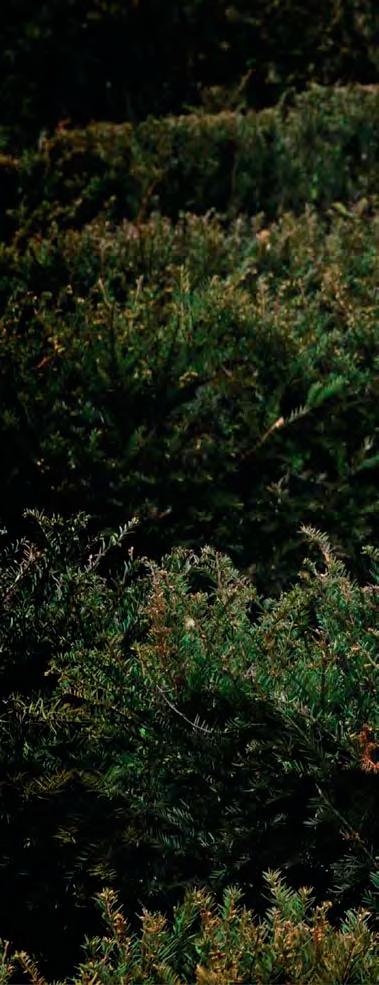
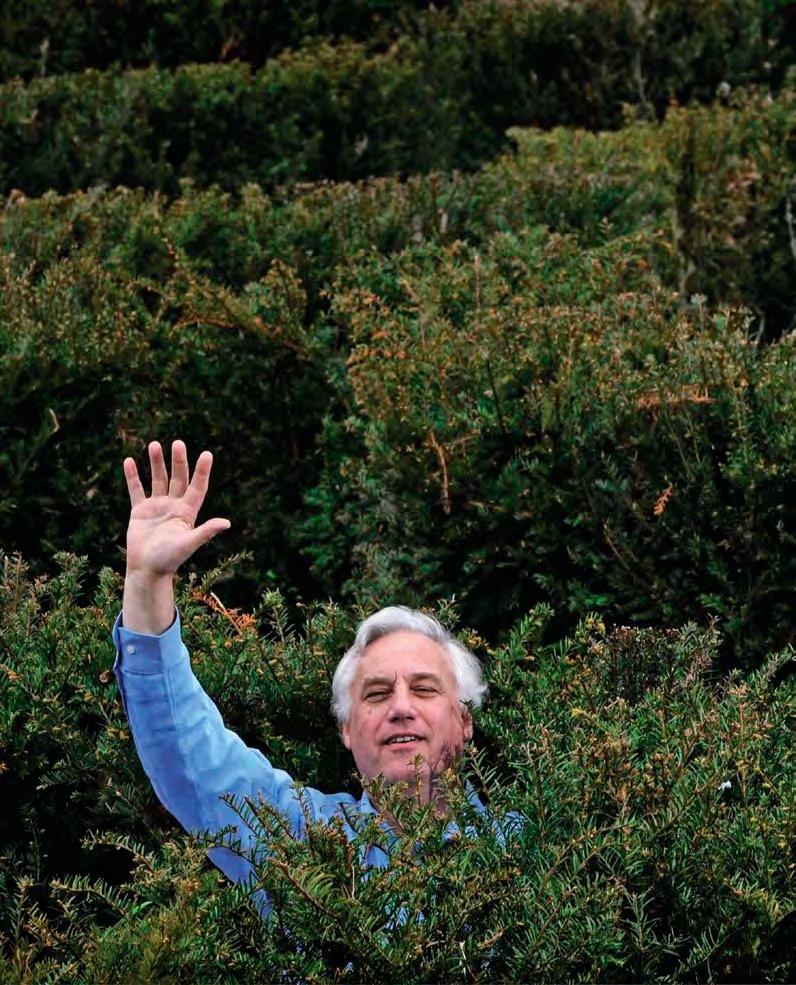
“It came from a former lady-in-waiting to the Queen Mother—Lady Brunner,” he recalls. “She invited me over, not just to talk about mazes but to discuss building one in the grounds of her home near Henley-on-Thames. I’d never received any formal training in maze-making, but I’d read a lot about their history and had a huge number of thoughts and ideas on the subject.
“It was incredible really, and rather old-fashioned. She must have seen something in me that inspired her. I came up with a design for a brick path in a grass maze, incorporating religious symbols
Maze Tower in Dubai. The balconies on the front and rear form real puzzles

and shapes, produced some estimates and did the work.”
Appropriately enough, the supremely well-connected Lady Brunner invited the archbishop to come and bless it.
This wasn’t the first maze Adrian had built. As a teenager, obsessed with them, he’d created one in his father’s back garden in Bournemouth. But it was by far the most prestigious, and his first professional commission. The self-taught designer—who’d previously worked in accountancy, sales and telecommunications— realised that he could now fulfil a long-held ambition to make mazes for a living.
He hasn’t looked back. Over the last 33 years, Adrian, 62, has built some 700 different mazes all over the world—including the US, Canada, Japan, Italy, Austria, Mexico, Thailand and Colombia.

There aren’t many maze designers in the world, and none of the others has a reputation anywhere close to that of Adrian, who’s also written a small library’s worth of books on mazes, making him the world’s leading authority on the subject.
In his time, Adrian has designed mazes based on everything from chess to Alice in Wonderland, from the ocean to the jungle, and from alien planets to the ancient pyramids of Egypt (“Can you break the mummy’s curse?”).
Maze owners often want an installation that looks like a recognisable shape from the air, so other designs have included

things like a skull and crossbones, or the head of a wild animal.
Prices vary considerably, but a mirror maze will cost around £80,000–£90,000 in Europe (£40,000–£50,000 in the Far East), while a really top-quality hedge maze might come in at around £250,000.
adrian has built 700 different mazes all over the world
How many babies do you see? The Mirror Maze with triplets at the National SeaLife Centre in Birmingham
Adrian’s wife Marie, who runs the administration side of the business, has six framed Guinness World Records awards over her desk, testimony to the sheer scale and ambition of some of Adrian’s projects. The cornfield maze he built at Stewart’s Garden Centre in Dorset in 2004 was, for the year that it stood (a cornfield maze only has a limited lifespan) the biggest in the world, at 16.9 acres. The previous year, Adrian had claimed another title by building no less than 47 different cornfield mazes in eight different countries, in the space of 12 months.
Although initial visualisation is very much Adrian’s department, he has some 20–30 specialists working for him, including builders, gardeners and craftsmen, making everything from ►

mosaics to stained glass to metalwork. He also uses fences, fountains, hedges and boulders in his mazes, and it makes no difference to him whether his walls are made of water, wrought iron or multicoloured tent material.
Recently, the father of six children—aged 15 to 36—has even made the move into buildings. Witness the 55storey apartment block in Dubai, built in 2012, in which two of the outer walls are vast, upright mazes.

“The balconies of the apartments are part of the puzzle,” he says. “The man who owns the building is mad about mazes.
I asked if it would matter if some of the vertical sections interfered with the view from the building, and he said not at all. The important thing, he stressed, was not to compromise the maze concept.”
Just as dramatic is the installation he completed in 2011 in the grounds of an
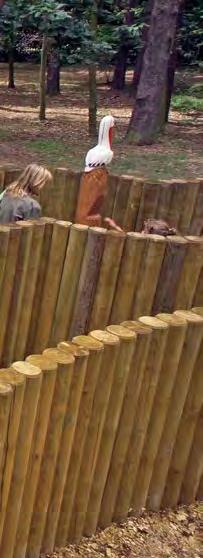
estate owned by an Italian count, near Verona. Not only has Adrian built his client a mysterious tower in the middle of a hedge maze but, once there, visitors descend a spiral staircase into an underground chamber where the count’s fossil collection is stored. At the end of the chamber the only way out is via a mirror maze built into the side of a cliff.
“The starting point for any maze is always the person you’re building it for,” insists Adrian. “I always do a little research on a project beforehand, but I need to find out not just about the history of a location, but about that person’s sense of adventure and sense of humour. Visitors love to feel that they’re looking over the shoulder of the person who had the thing built in the first place.”
Inspiration is never far away from the Fisher imagination. Even as we walk around his garden talking, he’s coming up with ideas.
“What if you got to what you thought was a dead end in a maze?” he suddenly asks. “Perhaps you sat on the bench here, and then suddenly found yourself being transported
backwards through the hedge on rails?”
Naturally, he’s built a maze in his own back garden, the centrepiece of which is a perfectly formed octagonal tower with battlements on the top and little rectangular panels of local slate built into the brickwork.
The maze serves as a focus for all Fisher family garden parties, at which he’s always asked why exactly it is that a series of bafflingly interlocking hedges holds such appeal for him—and humans in general?
“The fact is, we all love being a bit lost,” he replies. “A maze, to my mind, should be a joyful thing. Ideally, a real challenge, but one where you find your way out just before you’ve had enough— when fun and disorientation are still operating hand in hand.”
Not content to stick with the status quo, his mazes often have more than one configuration, ensuring that on different days, staff shut some gates and open others. Return visitors discover this to their astonishment, for instance, at Adrian’s mazes at Speke Hall and Aigburth on Merseyside, and at Staunton Country Park in Hampshire.
“a maze should be joyful. the fact is, we love being a bit lost”
“That way, someone who’s already visited the maze will find they no longer know the solution to the puzzle when they come back,” he beams, clearly delighted with this idea.
“Then, of course, you can throw in different tasks that have to be completed. Perhaps you have to visit four towers in the course of your journey,
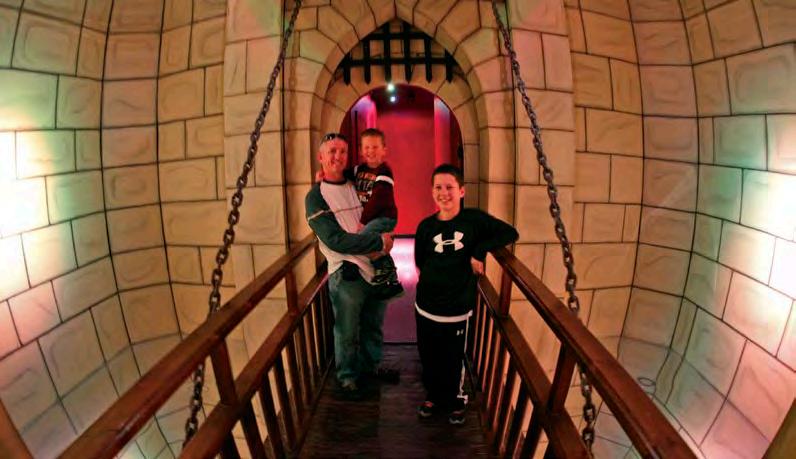
or answer 12 quiz questions at 12 different points.”
He’s also building into his mazes the idea of searching for artefacts and having to crack codes, as at his Smugglers Maze installation in the grounds of Atlantic Village in Bideford, north Devon. The aim is to introduce not just an element of play, but also of education and family bonding.
“Just imagine you’re with your father in a maze,” he enthuses. “You’re not at school, he’s not at work: you’re on an equal footing. Then you come across some wonderful old-fashioned object. A brass sextant, for example. You feel good that you found it together. Then you discover that it was with this device that British sailors managed to navigate the oceans and, as a result, control an empire that stretched across the globe.
“I guarantee that the two of you will never forget that moment—or what you’ve learned.
now you see it

Some of the places in the UK you can find an Adrian Fisher maze:
Speke Hall, Liverpool
London Dungeon (pictured above)
Scone Palace, Scotland
Louis Tussauds, Blackpool
Alnwick Castle, Northumberland
Leeds Castle, Kent
Newquay Zoo, Cornwall
Legoland, Berkshire
Longleat House, Wiltshire
“That’s what makes a maze so different from the standard theme-park rollercoaster ride. You’re not just experiencing a thrill, you’re seeing a whole world open up before your eyes.”
“I call Adrian the Roald Dahl of mazes!” says Marie. “Not only does he have this amazing ability to think and imagine things in 3D, but he always comes up with themes and stories that bring those shapes to life.”
And it’s this X factor, with Adrian happy to make walls out of ground-level mosaics, ten-foot-high corn maize plants or soaring jets of water, that makes his mazes so popular.
His creations are “the Rolls-Royces of the labyrinth world”, says Laurie Brokenshire of the UK Inner Magic Circle.
constantly being asked to come up with ever-bigger ideas in ever smaller amounts of time.
“We turned round one new maze in Arizona in just 13 weeks, from start to finish, and one in Spain in just 11 weeks,” he says. In recent years, the firm has constructed about 20 mazes a year.
“The world is getting faster but, by contrast, the origins of the maze stretch back many long centuries to ancient Greece and beyond,” Adrian concludes.
“the origins of the maze stretch back centuries to ancient greece”
“If you’re looking for a standalone attraction that creates return custom, Adrian Fisher’s company is the only answer,” says Tom Gantz, director of Noah’s Ark Water Park in Wisconsin.
As a result, Adrian and his team are
“It has a mystical, a magical and a symbolic appeal that’s hard to put your finger on.
“All I can say is that, when you step inside a maze, it has an effect on you that cannot be measured in a conventional way. It simply cannot be expressed in sentences, in numbers or in digits. It is, I really do believe, a sort of magic.” n
To explore the world of Adrian Fisher mazes, visit adrianfisherdesign.com.
A burglar at the residences at the University of Lyon was caught in the act of breaking into a room. But when police investigated further, they found that an ear print left on the doors to 80 or so more rooms belonged to the burglar. Before breaking in, he would listen at the door, little knowing that ear prints are as unique as fingerprints


The likes of Amazon and Google are killing many worthwhile jobs and creating uninspiring, unskilled alternatives, says Adrian Hon
Good news! After years of crippling recession, rich countries are finally beginning to add jobs again. The really lucky new employees are those who’ve leapt into future-facing internetdriven roles, such as programmers, web developers and social-media consultants. Many people have no doubt landed some plumb jobs in other fields too.
THinking
But not everyone’s celebrating. Just as the internet has created new opportunities, it’s eliminated countless others. Of course, the rise in online shopping and services has had a big impact on the high street. HMV (4,000 workers in the UK), Blockbuster (60,000 worldwide) and Borders (20,000 worldwide) are only three of the retail giants who were outcompeted by Amazon, Netflix, LOVEFiLM and others. The personal advice of thousands of staff in music or bookstores has been replaced by automated recommendation engines and unpaid user reviews.
►

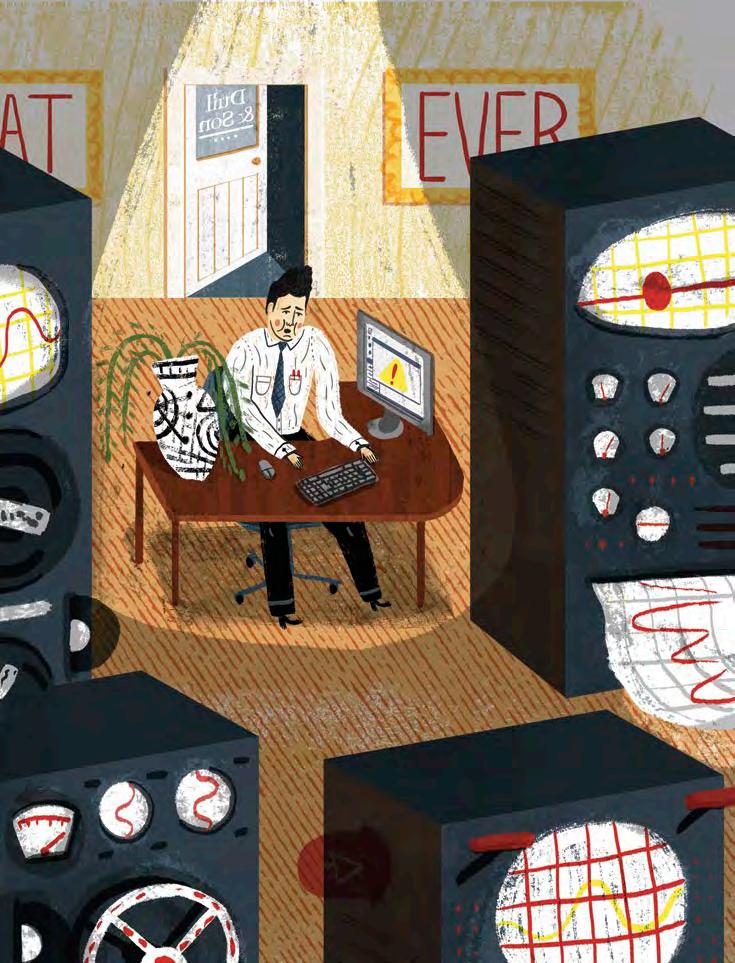
And the eternal quest for cost cutting in government services has led us to significant automation. We can already file taxes, renew passports and apply for immigration certificates online without speaking to a single human being. In a few years, the range of services will include claiming farm subsidies and disability payments. The savings to the taxpayer are certainly cause for celebration, but not if we’re paying for it with too many lost jobs.
Perhaps our former civil servants should retrain for jobs that are harder to automate; more skilled or creative work, like journalism or teaching. Surely those are safe?
in THE facE of THis TEcHnological crusaDE, is THErE any HopE for us HuMans?
◄ the bearer of a cornucopia of services from translation (Google Translate) to personal assistants (Google Now) and research (Google Search). Google would be the first to admit that none of these services can match up to the best human experts, but when you’re paying nothing for them and they’re delivered in the blink of an eye, most people aren’t complaining. Even scientists and mathematicians can’t rest easy. Researchers at the University of Cambridge recently unveiled cutting-edge software that can review and correct descriptions of complex chemical structures in scientific papers, replacing at least in part the role of deeply knowledgeable human reviewers. Even more impressively, the software takes less than a second to complete a review.
Unfortunately not. Readers of US business magazine Forbes may—or may not— have noticed that, in recent months, some of its articles were written by Quill. This is not the name of a person; it’s a piece of software that can “automatically” write perfectly serviceable articles about things like football matches, corporate results and property news, simply by ingesting the relevant data. Supposedly, the going rate is a few pounds per article.
As for teaching, online courses such as Udacity and the Khan Academy, along with their ancestor The Open University, educate increasing millions around the world every month. Relying on taped lectures, interactive quizzes and discussion forums, they require far fewer human educators than normal schools and universities. And Google has become
But given that the internet has been with us for decades, why isn’t unemployment increasing? Well, according to the Office of National Statistics, only low-paid jobs have increased in number across the past five years, whereas employment in all other jobs still remains below its peak. Some types of lesser-skilled roles are in fact quite difficult to automate, particularly those that involve physical human interaction. It’s precisely these jobs—waiters, teaching assistants, nurses, residential carers—that are growing most rapidly.
And while Amazon has employed
many thousands of workers in its warehouses to deal with the thousands of items per minute it sells, transferring objects from the right shelves into the right boxes isn’t a job any child dreams of, let alone one that has any genuine opportunity for advancement or intellectual challenge.
medical artificial intelligence to diagnose illnesses more reliably.
Does the internet spell doom for our jobs?
Join the debate at facebook.com/ readersdigestuk or email readersletters @readersdigest. co.uk
So in the face of this technological crusade to automate everything, is there any hope for us mere humans? Observers, including respected US economist Tyler Cowen, claim that the best path forwards for workers is to learn how to work with computers in order to augment their own abilities. Think of a financial analyst who uses article-writing software to create richer reports; or a scientist who discovers new insights from vast data sets using expert systems; or a doctor who uses
But advances in robotics and the internet mean that all jobs could be automated eventually, at which point adaptation would be futile. As a result, we may end up working much less. It’s possible we could see 15- or 20-hour weeks in only a couple of generations.
If and when that day comes, we may finally live in a comparative utopia, free to pursue whatever interesting occupations we like for our own entertainment—except, of course, for the question of who’s going to pay us to do them. Or that they could be performed by the internet faster and cheaper... n
Adrian Hon is author of A History of the Future in 100 Objects (£14.99) and CEO of fitness-app developers Six to Start.
To dunk or not to dunk: that is the question. But the age-old conundrum for lovers of tea and biscuits may now be resolved. Researchers have discovered that McVitie’s Rich Tea biscuits are the best for dunking in a cuppa after “the most comprehensive study of its kind” (carried out, coincidentally enough, on behalf of McVitie’s). It found the biccies lasted more than 20 seconds immersed in tea before falling apart, compared with 11 seconds for Chocolate Digestives and a measly four seconds for plain Digestives, Hobnobs and Ginger Nuts. This prompted study leader Dr Stuart Farrimond to call for a “dunk-o-meter” guide on all packets of biscuits. “A red circle would indicate a short dunk of under five seconds, amber would advise a five- to ten-second dip, and green for longer,” he suggests. The Nobel Prize committee are no doubt pricking up their ears…




This month’s elections for the European Parliament matter more than ever, warns Roger Boyes.
A low turnout spells trouble ahead

Flying wa S a li F elong pa SS io n for Lufthansa pilot Reinhard Prigge.
“I still can’t get over it,” he says.
“You clock in and sit down in what’s effectively an office travelling at 600mph and, at the end of the day, you’re in San Francisco or Hong Kong.”
But at the age of 60 Reinhard was forced to retire from the cockpit by the German airline’s regulations. And then Lufthansa was overruled by the European Court of Justice. The airline hadn’t complied with European Union law, passed by the European Parliament. Pilots declared fit are allowed to fly until the age of 65 as a member of a crew in which other pilots are younger than 60.
This was hailed by some—including professionals such as surgeons and diplomats—as a blow against institutional ageism. And it clearly demonstrates that the European Union has the power to establish and uphold Europe-wide rights for individuals.
Take another example. Mohamed Aziz is a Spanish resident who lost his job in the recession and was evicted along with his young family from his home in Barcelona. Enter the European Court of Justice, which ruled that tough Spanish mortgage-enforcement regimes don’t conform to European law.
Then there are the Swedish workers who commute to work in Denmark over the Oresund Bridge that links the two countries. Most were granted Danish child benefits only after two years of full-time work. The European Union demanded that Denmark change its rules to comply with EU regulations, which state that workers are entitled to benefits after working a minimum of six months in any EU ►
country. And Denmark complied last October.
While many see such cases as showing the European Union working for the common social good, others strongly disagree. For a growing number of Euro peans, the power of the EU to protect people from their own governments has become much too intrusive. They object to the erosion of national sovereignty and the emergence of a meddling European superstate.

frustrated citizens to vote in this month’s European elections. They want to enter parliament, Trojan-horse style, precisely to undermine European integration.
They don’t want to reform the EU so much as emasculate it. One such figure is Marine Le Pen of France’s Front National, who’s predicted with glee that the European Union will “collapse like the Soviet Union”.
Many people—including those who support its principles—now view its institutions and personnel as, by turns, remote, haughty, unaccountable and at times corrupt. And that’s created an opportunity for the EU’s political enemies.
Across the continent, right-wing political parties are now mobilising these
The EU’s 28 member states go to the polls May 22–25 (it’s May 22 in the UK) to elect 751 euro-deputies to Parliament, the only directly elected institution of the European Union.
Countries choose their own voting system but the elections, held every five years since 1979, must be based on proportional
For committed Europhiles such as Martin Schulz, the 58-year-old German who occupies the role of president of the European Parliament, the only way to head off this threat from the far right is to get more people to vote. He needs to rally support for a moderate, efficient and more democratic EU.
To succeed, he’ll have to reverse a trend that’s seen voter turnout plunge from a high point of 62 per cent in 1979
representation. Each will have between six and 96 seats, taking the size of country into account (smaller states benefit disproportionately).
Parliament is one of four institutions that govern the EU. The leader of the group is the European Council, where the 28 heads
of state and government determine policy.
Implementation passes to the European Commission, the EU’s civil service of 28 commissioners and about 24,000 staff, which proposes new laws and drafts legislation. This is debated, often amended in up to three readings, with texts batted back and


Marine
is clear about her motives: “I’m interested in Europe, because I’m fighting it”
to barely 43 per cent at the last election in 2009. It’s a dismal record for the world’s only directly elected transnational parliament.
“European Parliament elections are often used as a stick with which to beat an incumbent government,” says the Danish political scientist Maja Kluger Rasmussen. But this time the stakes are higher. The election may even be about saving Europe itself.
The EU needs urgently to take further measures to tackle eurozone debt, and the widening rift between north and south. It needs to become more competitive in the struggle for world markets —and to do so it must overhaul the socialwelfare system and pension provision in
forth between Parliament and the fourth EU body, the Council of Ministers
At any given meeting, this fourth institution comprises the appropriate national government ministers responsible for the subject being considered.
While Parliament lacks the right to initiate legislation, it can in practice ask the Commission to draft a bill. And its powers have
an ageing society. It has to define its frontiers more closely and work out how it’s going to deal with immigration. It has to generate the kind of growth that will provide jobs for the young.
t o get more people V ot ing, S ay S Polish euro-deputy Jacek Saryusz-Wolski, the public needs to be reminded that the European Parliament plays a key part in all of this and more. “After all, some 70 to 80 per cent of national legislation that directly impacts on the lives of citizens originates at the level of the European Union,” says the veteran deputy, one of his country’s most knowledgeable experts on Europe. What’s needed, says Saryusz-Wolski, ►
increased since the Lisbon treaty was ratified in 2009. The nominee put forward by the largest panEuropean party elected to Parliament is, for the first time this year, expected to become President of the Commission. Parliament is also able to reject the new President and the commissioners he or she appoints. Along with the Council of Ministers, it has authority over the EU budget.
responsibilities
Parliament, together with the Council of Ministers, passes judgement on any issue that the Commission thinks is best dealt with by collaboration between member countries, such as the environment, immigration, international aid and energy.
Development of the single market is a key focus, aiming to bring consistency on aspects such as employment, women’s ►
rights, consumer protection and, recently, a cap on bankers’ bonuses.
Parliament meets in fourday sessions every month except August, and for six annual two-day “mini sessions”. These are held in Brussels or Strasbourg. The costly process of moving between them has been described as a “travelling circus”. Euro-deputies, each paid €95,482 a year
◄
plus generous expenses, are divided into seven loose “groupings” of likeminded politicians from the various member states. These include the Party of European Socialists, the Greens, the Eurosceptics and the European People’s Party—the largest group with 275 members, which features Angela Merkel’s Christian Democratic Union. Euro-deputies also sit on parliamentary committees, which further scrutinise
is increased public awareness, so that voters feel an emotional connection with the institutions of Europe. “One idea would be to make basic knowledge of the EU part of the school curriculum,” he says.
It’s not just about getting voters to the ballot box this month, though. The citizens of Europe have almost no sense of what is positive, even life-enhancing, about European membership.
Few are aware, for instance, of the European Citizens’ Initiative, which aims to bring the EU closer to its citizens. Introduced three years ago, it allows any citizen to call for a new European law on an issue of their choice, provided they have a million supporting signatures from at least seven member states.
If members of the European Parliament are looking to justify their work to often sceptical and indifferent voters at home, they might start by pointing to the EU’s strong record on protecting consumer rights.
policy on issues ranging from energy to agriculture, culture and social affairs.
The three main working languages are English, French and German. But speakers frequently address sessions in their mother tongue, so the EU employs more than 1,200 interpreters and a further 700 translators who translate more than 100,000 pages a month.
From this summer, for instance, mobile-phone customers in Europe will no longer be charged extra for receiving calls while travelling in another EU country. The scrapping of EU roaming charges will help businessmen on the move and also millions of holidaymakers.
Even Europe’s health-and-safety regulations, seen as exaggerated and costly by many owners of small businesses, can be turned into an election asset. From this December, all allergens, including peanut and milk, will have to be marked on packaging even if they’re present only in trace amounts. If that saves even a handful of children from choking to death because of nut allergies, the parliament will have done its job well.
Although European Parliament constituencies are much larger than those in national parliaments, most eurodeputies have researched quite carefully who is voting for them. The problem is that voters don’t have the faintest idea who is representing them.

“All we know is that euro-deputies disappear to Belgium, are paid a packet and are never heard of again”
“I don’t know who my euro-deputy is. It just doesn’t enter my frame of reference,” says 36-year-old Warsaw-based magazine editor and food critic Kaja Burakiewicz. “Where’s his office, what’s he doing for me? All we know is that they disappear to Belgium, are paid a packet and are never heard of again. It’s a kind of nirvana for washed-up domestic politicos.”
Clearly, the e uropean parliament has an image problem. Although the majority of euro-deputies are hard-working and conscientious, some euro-deputies collect their attendance fees and then disappear for the day. Others— even under tightened rules —employ family members as secretarial or research staff and exploit generous expenses.
Fighting for Europe: Parliament presidentMartin Schulz
Certainly, Marine Le Pen makes no secret of her ambition to seize back all economic and budgetary powers ceded to Europe. “Our old European nations are forced to ask for the authority of Brussels in all circumstances,” she complains. “They are forced to submit their budgets to the headmistress.”
Her Dutch ally, Geert Wilders of the Party for Freedom, is calling for nations to take back control over their borders, their currency and their economic management.

The paradox is that the politicians most likely to smear the European Parliament as corrupt are the ultra-nationalists, who are at the very same time trying to boost their presence within it. Marine Le Pen is clear about her motives. “I’m interested in Europe,” she says, “because I’m fighting it with all my strength.” And supporters of her Front National party talk about cleansing the “Augean stables” of the parliament.
Their joint aim is to create an officially recognised political “grouping” in the European Parliament. For that you need 25 euro-deputies representing a quarter of EU member states. This should be within reach: opinion polls suggest Marine Le Pen’s party alone will capture 15 seats and become a magnet for the likes of Hungary’s ultra-nationalist Jobbik party (tipped to win three seats) and Greece’s far-right Golden Dawn party. The Bulgarian Attack Coalition, the Greater Romania party and the Austrian Freedom party are likely to join in too.
Do they pose a serious threat? Will it shake up the whole idea of Europe? If getty images ►
◄ the same likely parliamentary grouping, are anti-Semitic (Jean-Marie Le Pen, founder of the Front National and father of Marine, has frequently used insulting language about Jews). And some are virulently homophobic.
they belong to a political grouping, euro-deputies may be placed on crucial committees and can sway parliamentary voting. Ultra-nationalists, strangely perhaps, would be at the very heart of a project set up to transcend nationalism. And Europhiles will have to fight much harder to make their voices heard.
Sea Soned e uro pe-watC he r S thi nk that any ultra-nationalist coalition will quickly fall apart. The Dutch Party for Freedom, for example, favours same-sex marriage and is an enthusiastic supporter of the state of Israel. Other parties, in
Even so, the surging popularity of ultra-nationalist parties is making the supporters of an integrated, tolerant Europe work harder to explain their mission. For the first time in its history, the European Parliament is engaged in a real battle of ideas. All the more reason why moderate voters of Europe should go to the polls this month. n
With the travel season fast approaching, many of us will be merrily snapping away on our cameras and smartphones. So at least look like you’re enjoying yourself more than these holidaymakers—as seen at awkwardfamilyphotos.com:



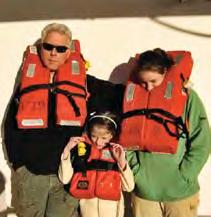
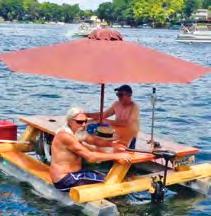






Micronutrients with iron, zinc & iodine, which contribute to normal cognitive function
Neurozan® is an advanced, comprehensive formula to help safeguard your daily intake of essential vitamins and minerals.
Including iron, zinc and iodine which help to maintain normal cognitive function and pantothenic acid which supports normal mental performance.
Neurozan® Original contains a specially developed combination of nutrients and is certified by Food For The Brain.
Neurozan® Plus dual pack provides even greater nutritional support with high purity Omega-3 from Norway. DHA helps to maintain normal brain function.
So if you’re looking for a supplement that’s different, keep Neurozan® in mind.




Neurozan® is certified by pioneering charity FOOD FOR THE BRAIN. www.foodforthebrain.org
From , chemists, Waitrose, Holland & Barrett, health stores & www.neurozan.com
The UK’s largest DVD/CD mail order company!

Based on A. J. Cronin’s novella, Country Doctor, the much-loved drama centres on a general medical practice, in the fictional rural Scottish town of Tannochbrae, between the wars. These ten episodes are all that remain of the original second series. Starring Bill Simpson, Andrew Cruickshank and Barbara Mullen.
135017 Cert PG 8hrs 30

Series 1
134964 Cert 12 10hrs
OUT ON: 21/04/14

3 DVDs £34.99 £19.99

Holocaust
30th Anniversary Collectors’ Set
Meryl Streep, James Woods, Michael Moriarty, Tom Bell, Marius Goring and Ian Holm star in this epic, TV mini-series which follows the tragedy and triumph of the Weiss family from 1935 until 1945. Filmed in Berlin and Vienna, this intensely moving drama won eight Emmy awards.

3 DVDs
All 12 episodes of this Emmy award-winning epic journey into the history of the Wild West from the 1790s to the 1970s starring Richard Chamberlain, Robert Conrad, Timothy Dalton, Lynn Redgrave and many more. Based on James Michener’s bestseller. Subtitles


6 DVDs
134816 Cert 15 20hrs 48
131378 Cert 15 7hrs 36
The BBC’s dramatisation of Tolstoy’s epic story of love and loss, set against the backdrop of the Napoleonic Wars. Anthony Hopkins heads the cast as Pierre Bezuhov – a role for which he won the 1972 BAFTA for Best Actor. Includes all 20 episodes. 132589 Cert PG 14hrs 50

TV epic starring Robert Mitchum as Victor “Pug” Henry, a career naval officer who, along with his family, learns to navigate the waters of tumultuous times in the late 1930s. Co-stars Ali McGraw, Polly Bergen and Ralph Bellamy. 131376 Cert 12 14hrs



Welcome to the pages that help make life simpler, easier and—we hope—more fun!
Haddock, hake, lobster, cod and plaice are at their best this month, but it’s worth spreading the net wider (metaphorically at least) before tucking in. Almost 80% of fishing grounds are over-fished, which along with climate change and pollution could see many traditional favourites vanish from our plates.
Among the most at risk are shark, swordfish and skate, whitebait, eel and bluefin tuna, says the Marine Conservation Society. But almost any can be threatened if they’re caught in the breeding season or scooped up as by-catch by enormous trawl nets.
Though working out what
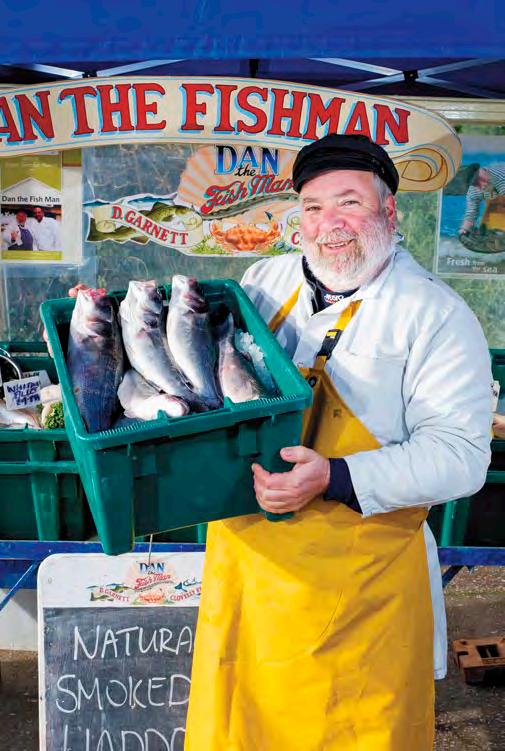
to buy is complicated, there are shortcuts for those with limited time and patience. Choosing organic farmed fish may hammer your budget, but it means we can eat endangered fish like halibut, sea bass and tiger prawns with a clear conscience. Prefer free-range? Then buy locally caught seafood and eat smaller species such as sardines and dabs, which multiply faster than rays or cod. To find the most ethical choice, check labels for the letters MSC (Marine Stewardship Council) on wild fish, or ASC (Aquaculture Stewardship Council) on farmed.
If this is too expensive, seek out less highly prized fish. Swap cod for whiting (its smaller cousin), pollock (good in fishcakes) or coley (“Not just for cats!” says the MSC). Try crawfish and mussels instead of prawns, and buy skipjack tuna, the only plentiful type. And we can dine out on anchovies, trout and crab because there’s no shortage of those.
For flowers
you can enjoy outside and in, there’s little to beat a window box, and now is the perfect time to plant it. For maximum impact, fill it with flowers in two contrasting colours or go for similar shades (purple/blue or lime/yellow, say). Boxes look best

with plants of different heights, which bloom in sequence and are right for the conditions you can provide—be it hot, shady, or oops, forgot the watering. Here are five with the wow factor.
● sunny Plant pink/purple petunias and pelargoniums (which slugs hate) with frothy bacopa, or go for gold with marigolds, tangerine Princess lily or Inca Gold sunflower.
● shade-loving Mix fuchsia and New Guinea impatiens with London Pride and heuchera. Or concentrate on foliage—ivy, coleus, hart’s tongue fern and trailing licorice.
● scented For fragrance from dawn to dusk, plant sunlovers like lavender, nemesia and scented-leaf pelargoniums with heliotrope, nicotiana or nightscented stocks.
● Edible For summer-long salad, grow rocket, nasturtium (you can eat the leaves), peppers and tumbling Tom tomatoes. Window boxes are also perfect for herbs such as thyme, parsley, coriander, chives and trailing rosemary.
● Instant Cheat with pots of daisies in summer and viola in winter, plus ivy and herbs for greenery.
Where we shop is equally important, but good fishmongers are rarer than clam’s teeth and standards in supermarkets vary. M&S and Sainsbury’s are the most fish-friendly, according to the Marine Conservation Society, followed by the Co-op and Waitrose. If there’s not one nearby, it’s worth pinning a wallet guide of responsible picks to your shopping list (visit fishonline.org). ►

The growl of thunder isn’t just a warning to abandon a picnic.
Lightning can strike up to ten miles from the centre of a storm, say experts at BBC Weather, and if you can hear it rumbling you’re at risk. Though deaths are falling now fewer people work outdoors, up to 60 are hit by lightning—three fatally—each year, according to the Tornado and Storm Research Organisation.
Lightning takes the shortest route to the ground, usually via a high object standing alone. Head downhill if you’re outside, to dry land if you’re on the water, and keep your distance from isolated trees. (As lightning runs
through the ground, the Met Office recommends staying twice as far away as the tree is high.) Out in the wilds, find a ditch or a low clump of trees to shelter in. Should your hair stand on end and skin start to tingle, lightning is imminent, so squat down with your head low and feet together to minimise contact with the ground.
Inside or out, it’s important to stay away from metal and water, which conduct electricity, including wire fences, radiators, and baths. The exception is a car, which gives excellent protection because lightning flows over it before discharging into the

ground. You might want to avoid helicopters though— research by the Met Office shows that in certain conditions they can trigger lightning, causing up to three strikes in the North Sea every year.
We want to be law-abiding, but modern life is so complex that it’s easy to stray. As ignorance of the law is no excuse, here are a few traps to avoid.
driving turns us all into sinners. Apart from the limits and restrictions we know about, there are also “distraction offences”—lane-hogging, undertaking, tuning the radio and eating at the wheel now attract a fine of £90 plus three penalty points. And if the address and photo on the licence aren’t up to date, we can be fined an eye-watering £1,000.


Other lightning conductors to avoid are umbrellas, golf clubs and rotary clothes lines (so don’t rush to get the washing in). Unplug appliances like kettles, hairdryers and landlines, which transmit an electrical charge, plus TVs and laptops. And if you’re wondering how to fill your time, it’s an ideal opportunity to curl up with Reader’s Digest and wait for the storm to pass! ►

Gardens are a paradise for bureaucrats. Don’t even think about putting up a fence over a metre high next to the road or paving a front garden without planning consent. Permission may also be needed for a pond close to an airport, as it increases the chance of bird strike. An evergreen hedge over two metres high can attract a £1,000 fine, but don’t reach for loppers without checking if a tree-preservation order is in place—fines reach £2,500 for unauthorised work. Better perhaps to stay indoors. But remember that watching TV without a licence is still a criminal offence for now that sees more than 3,000 people taken to court each week. A licence isn’t needed for catch-up TV, but it is for live broadcasts, so think twice before clicking on an online news feed. Other web-based crimes include copying images, illegal file-sharing and libellous tweets.

how about confronting a professional lawbreaker in our homes? It’s now legal to use force against an intruder if our lives or our loved ones’ are at risk, but not if a burglar’s prowling outside or we’re defending property rather than people.
wHat your funeral director won’t tell you

● you don’t have to hire me. You can save two-thirds of my £3,500 fee by organising a funeral yourself. As long as you’re prepared to store the body, transfer it to the coffin and screw down the lid, book the burial or cremation, hire a hearse and lead the service while you’re still grieving.
● your loved one’s going on a journey. You may think they’re in the chapel of rest, but in fact they’re often stored in racks at a funeral “hub” or warehouse. A giveaway sign is if you’re asked to wait a few days before viewing the body, which has to be shipped back.
● natural burial grounds aren’t gardens. Some are more like wilderness, with no way of knowing where your loved one is buried. Make sure you look round first and ask about the company’s long-term plans before you decide. Vague talk of giving it to a wildlife charity won’t do.
s ources: s pecial thanks t o c harles
c owling of c onsumer website t he g ood
f uneral g uide (goodfuneralguide. co.uk). o ther sources: c hannel 4, go v.uk, g reen f uneral s er vices, Which?
● That’s not my name on the door. Hint: look for a logo—it’s usually a sign that the business is owned by a chain such as Dignity or Co-op Funeralcare, And don’t be misled by the reassuring “family-owned funeral director” tag. It may be part of a much bigger family firm.
● I’m unlicensed and unqualified. Anyone can open a funeral parlour and training’s not mandatory. Choose a Good Funeral Guide accredited firm,
or at least one who’s a member of a recognised trade association —keep an eye out for the initials NAFD and SAIF.
● Turn to the back of the brochure. That’s where I tuck away details of the cheapest “basic” or “simple” funeral, which I’m unlikely to mention unless asked.
● “hygienic treatment” is optional. It’s trade-speak for embalming and some funeral
● keep the eulogy short. Most crematoriums want you in and out in half an hour, which only leaves 20 minutes for the service. If you have more to say, opt for burial instead or organise a memorial service later.
● wood coffins are optional. Though the law says the body must be covered, you can be laid to rest in a leaf cocoon or a cardboard box. The simplest eco option is a shroud, but most crematoria draw the line at that.
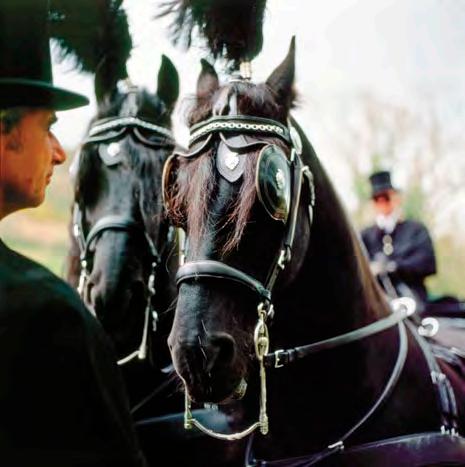
directors insist on it before you view the body. If you don’t want it, just say no.
● There’s no such thing as a final resting place. You don’t often buy a burial plot. You lease it, sometimes for as little as 25 years.
● sometimes the state will pay. You can apply for a social-fund payment to cover funeral costs if you’re on benefits. And if your spouse or civil partner dies before either of you have retired, you can claim a £2,000 Bereavement Payment.
● Most coffin handles are useless. However elaborate they are, the majority are merely decorative—which is why we shoulder the coffin.
● you don’t have to scatter the ashes.
“Cremains” can be turned into diamonds, sculpture or vinyl records that play the departed’s favourite song. If that doesn’t appeal, consider a new form of burial at sea, where “rocks” containing ashes are building a man-made reef (see solacereef.co.uk). n
max pemberton

“We just want a quiet life, Max,” said one of the junior nurses.
“I don’t understand what the problem is,” intervened the sister of the ward. In the background, I could hear Mrs Linwood shouting.
“Just sedate her, and then we can all get some work done,” continued the sister.
I dread confrontations like this. The nurses on this ward have held my hand countless times when faced with sick patients, so how could I pull rank and use the “I’m a doctor, you’re a nurse” card now? The nursing staff were being driven up the wall by Mrs Linwood’s shouts and screams, and they wanted me to sedate her. But I was supposed to be there acting in the patient’s best interest, not the medical staff’s.
Frustratingly, even if I did stick my neck out and refuse to sedate her, Mrs Linwood wouldn’t thank me.
She has severe
Nobody would reprimand me for sedating her, but my conscience wouldn’t let me
dementia, and wouldn’t even know what I’d done—or rather not done. And besides, no doctor wants to get on the wrong side of the nursing staff; they’ll make your life a living nightmare.
Elderly people are ignored by society. And as for people with mental-health problems, no one ever stands up for them either. Poor Mrs Linwood has the worst of it: she’s demented and old. What hope has she got? Nobody would reprimand me for sedating her, but my conscience just wouldn’t let me.

I went into the side room where Mrs Linwood was. I knew from reading her notes that her shouting out was an ongoing problem. But sedating patients is only a short-term solution, and the drugs have bad side effects
if repeatedly used. She wasn’t in distress—in fact, as I walked over to her bed, she stared at me blankly but started to laugh. Then she started shouting again.
The junior nurse appeared, holding a radio. “We could try this. It might keep her quiet for a bit,” she suggested.
I turned it on and tuned into a local station. It worked and she was quiet. I left the ward, acutely aware that I hadn’t really stood my ground; that the real issues hadn’t been addressed.
A few days later, as I queued up in the canteen, another doctor came up to me. “That patient of yours, Mrs Linwood, she’s annoying, isn’t she? Nurses paged me about her yesterday,” he said.
“Oh, her shouting?” I replied. Proud of my new discovery, I added, “But she’s quiet again if you turn the radio on.”
“Oh, I sedated her. Knocked her out flat,” he retorted bluntly.
I could feel myself burning with rage. I’d like to say that I shouted at him, that I told him it was wrong to sedate someone just because they were annoying the nurses, that I refused to be quiet—but I’m ashamed to say I can’t. I didn’t want to be branded a troublemaker, so instead I mumbled a few words, sat down and ate my lunch in silence.
There’s a part of all of us that, sometimes, just wants a quiet life.
Max Pemberton is a hospital doctor and author. He’s also the resident doctor on ITV’s This Morning
what’s the truth? Not only does butter not provide any relief from a burn and does nothing to help it heal, but it can actually cause harm. When you burn yourself, the flesh absorbs some of the heat, so that the skin continues to burn even after the heat source has been removed. Butter actually retains heat, so by putting it on the skin you can make the burn worse. Also, a bad burn will mean that the skin has been damaged and it no longer offers protection from infections. Butter is full of bacteria, so by placing it on burned skin you risk introducing infection.

where did the myth come from?
It’s likely that this is partly down to butter being cold, and so people assume it’s a good way of cooling the skin, not realising that in fact the burn heats up the butter. Butter is also good at removing tar from burns when the tar has stuck to the skin. Years ago, this was one way that workmen would get burning tar off their skin, and it’s likely it was therefore assumed butter is useful in all burns. Now, specially designed creams are used for removing burning tar.
so there’s nothing to worry about? Leave the butter in the fridge. The right way to deal with a burn depends on how severe it is. For a mild burn, run it under cool water. Don’t apply ice, as this can also damage the delicate skin tissue. For a large burn, seek medical advice immediately. ■
Find it hard to diet? Hate exercise?
Don’t despair. Increasingly, research is showing that quality sleep can help you control your weight.
People who don’t get enough zzzs have the munchies—and they crave higher-fat, higher-calorie food. In one study, sleep-deprived women ate a full 400 more calories a day than women who slept well over the course of four nights. And in another, men scoffed almost 600 calories more the day after having just four hours’ shuteye. Worse still, they ate 30 per cent more fat at dinner compared to men who spent eight hours in the land of nod.


that we’re full. When we’re sleepdeprived, ghrelin levels increase and leptin levels drop.
So why do we eat more when we stay up later? First, reduced sleep seems to disrupt two crucial hormones, ghrelin and leptin. Ghrelin stimulates the appetite, while leptin sends the signal to the brain
The other key theory is quite simply that there’s more time for late-night snacking when you’re awake for longer. And, let’s face it, you’re less keen to work out the next day when you’re cream-crackered.
l Relax before bed Read, meditate, listen to relaxing music, take a bath, or drink a cup of herbal tea.
l Try cherries Sounds unlikely, but cherries are one of the only foods that contain melatonin, a chemical that helps regulate our sleep.
l Have a light snack Nibble on something containing carbs and protein, such as milk and toast or a bowl of cereal, as this can help trigger serotonin, the “calming hormone”.
l Avoid alcohol It won’t make your sleep deep and restful.
l Limit caffeine It stays in your system for up to eight hours, so have your last latte by early afternoon.
Snog your partner ten times a day. A passionate kiss is meant to burn 6.4 calories a minute. That means that ten minutes a day equates to about 7lbs a year. Watch less TV. It seems that you’re more likely to eat—and eat more—when you’re sitting in front of the box. Bring blue into your life. This colour acts as an appetite suppressant, so try eating from blue plates or on a blue tablecloth.
Munch in front of the mirror. One study found it reduced the amount people put away by a third. A painful reminder of why you need to eat less, maybe?
Sniff a banana. Yes, really. One study of 3,000 volunteers found that the more frequently they sniffed, the less hungry they felt and the more weight they
Research has shown that men with gum disease are more likely to suffer from erectile dysfunction. Make sure you’re not one of them.
don’t:
l Share spoons—periodontal disease is contagious.
l Let the dog lick your face— you risk introducing new sources of bacteria into your mouth.
l Ignore a dry mouth—lack of saliva makes you more prone to gum disease and tooth decay. Speak to your dentist.

l Eat sweet snacks or drinks, including heavily sugared coffee, without brushing your teeth afterwards.

o:
Quit smoking—it wreaks havoc in your mouth.
Deal with stress—another factor in gum disease.
Act if you’re a teeth grinder—invest in a tooth guard.
Eat a balanced diet.
Use an electric toothbrush twice a day, half an hour after eating, and floss every day. ►
Beta-carotene, found in carrots and sweet potato, has been shown to help reduce the risk of certain cancers, including breast and uterine. Meanwhile, black pepper improves the intestinal absorption of beta-carotene. So couple them up in our yummy sweet-potato hummus in a bid to beat the Big C.

Chop 2 medium, peeled weet potatoes and steam or boil until very tender. Add to a food processor with 60ml tahini, 2tbs olive oil, 1 garlic clove, 1tbs brown sugar, ¼tsp dried ginger, ¼ tsp black pepper, a pinch of cayenne pepper, juice from half a lemon, 1 tsp orange zest and salt to taste. Process until smooth and serve with crudités.
It strengthens your heart. Regular exercise can lower blood pressure and halve your risk of heart disease. A 30- to 40-minute walk three times a week is enough. Step out to slash your odds of having a stroke. Spanish research found that walking for three hours a week cut women’s risk of a stroke by 43 per cent.
It could lower breast cancer risk. A recent study of postmenopausal women showed that the ones who walked seven hours a week or more were 14 per cent less likely to develop breast tumours than those who ventured out for three hours or less.

Marching can improve your memory. dutch researchers discovered that over-55s who engaged in aerobic activity had better recall and attention span.
Best foot forward to help prevent osteoporosis. Walking is a wonderful weight-bearing activity. Get out and about for 45 minutes every day to preserve bone density. Getting that muchneeded vitamin d from the sun will also help. Striding out can cut your chances of developing diabetes. Researchers at Imperial and university Colleges London found that people who walked to work were about 40 per cent less likely to have the disease than employees who drove in.
A good walk will lift your spirits. A wealth of research suggests that it’s an extremely effective treatment for depression.
1
An estimated eight million women in the uK experience some degree of hair loss, usually after the menopause when they have fewer female hormones. unlike men who go bald— about half do—women tend to have thinning hair on the crown only, and are spared a receding hairline.
2
There’s sometimes a medical reason if your hair starts falling out, for example, an underactive thyroid gland or low iron levels. Your doctor can test for both.
3
Shampooing correctly can slow down hair loss. Brush your hair from front to back with a stiff brush, use warm— not hot—water, apply shampoo at the nape of the neck and shampoo the hairline before moving to the top of your head, massage your scalp well, rinse thoroughly and finish off with a cool-water rinse to tighten scalp pores.
4 Stress, a high fever, aggressive hair dyes and overtight hairstyles can batter your barnet temporarily. As can certain medications, including

There’s sometimes a medical reason if your hair starts falling out
those for high blood pressure, depression and arthritis.
5
An international team of scientists, including researchers from durham university, has succeeded for the first time in growing new human hairs in the lab. Wayne Rooney and elton John, could this one day be the answer to your prayers? n

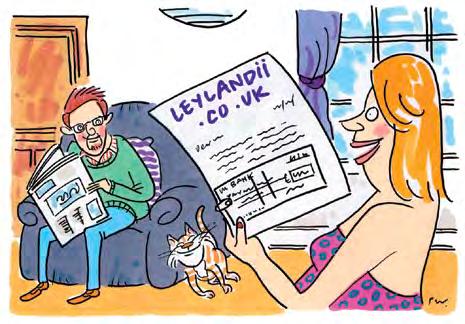
“Why, darling, another cheque! This company’s growth is phenomenal”
Ever fancied playing the stock market— but never been sure exactly how to do it? Our new monthly guide has all the answers you need
Investing in shares isn’t just about growing your money for the future. You can make a good, regular income from some equities. If you invest in shares that give good dividends, you can get a lot more from your money than you would with savings accounts. Here’s how to choose high-dividend shares.
What are dividends? A dividend is a portion of a company’s profits that is paid out to shareholders each year. Each share is allocated a dividend, so the amount you get in total depends on how many shares you have.

What do I get from it?
You’ll usually receive your dividend payments twice a year. You can either receive the cash from your dividend, usually via an electronic funds transfer into your bank account, or you can choose to reinvest that money in more shares.
How do I know which shares are high-dividend? There’s no guarantee that any shares you buy will give you good dividends into the future, but there are a few things you can do to make an educated decision…
1. Take a look at the company’s history For a safe investment, you should only consider companies that have consistently increased their dividends over the last 20 years. A company that regularly raises its dividends will also go some way to protecting against inflation (because you’re likely to get more money each year as prices go up).
Take a look at the Dividend cartoon by paul wood
Champions list at dripinvesting. org to see which companies have consistently raised their dividends. But make sure you check how much they’ve been raised by, as some rises may not have been enough to protect against inflation.
It’s a good idea to invest in a “blue-chip” company—ie, one of the big expensive ones like BP, HSBC or GlaxoSmithKlein—that has a strong reputation and is consistently profitable. You have more security with them.
Check out the company’s “sustainable growth rate”, which is the maximum growth rate it’s capable of without needing to borrow more money. Look for growth of 7% or above for a safe investment.
2. Invest in a company where the management receives dividends
This is a bit of an obvious one. Although it’s not a necessity, it makes sense to invest in a company where the CEO receives dividends. If management get an income from their shares, they’ll be less inclined to cut the dividends!
There’s no guaranteed way of ensuring you’ll make a good return, but if you follow this advice then you’re giving yourself a bit of security. There are also more specific strategies that you can research and follow, such as the approach suggested by Investment Quality Trends (IQTrends.com).
An estimated 300,000 people a year fall victim to home-working scams, and the number continues to grow. Here’s how to protect yourself from them:
l Spotting a scam
The majority of work-fromhome scam companies will ask you for money up front in exchange for information, special equipment or other materials. This should immediately raise a red flag. Most legitimate organisations will also have at least one landline phone number listed on their website. If you receive a call or email from someone who insists you should join their company, you can bet on this being a scam. Envelope-stuffing seems to be the most popular ruse, so be wary of any advert that offers the chance to make piles of cash for performing menial tasks like this.
l What to do if you suspect a scam Never send money. Most legitimate companies won’t require you to pay a fee for information or materials. Sound organisations will also never ask you to “confirm your bank details” online. Find out as much as you can about the company. Call them and ask to speak to several different employees about what it’s like to work there. Find out exactly what the job is,
this month’s bargain

Help your hair grow faster with FAST Shampoo and Conditioner, and get 25% off the price (£29.99) with our code: FASTFB25. Just put the code in at the checkout when you buy the shampoo at body4real.co.uk. Valid until May 20.
as scam companies will often be vague about the details. Ask the company when and how you’d be paid and whether or not you’d earn commission. Report any suspect companies to Consumer Direct or the Advertising Standards Authority.
l What to do if you’re a scam victim Contact the Office of Fair Trading right away. Most scam companies operate for a short while and then vanish, only to reappear with a new name and a new scam. Try to provide as much information as possible, including any names, street addresses, email addresses, phone numbers and descriptions of the job. You probably won’t recoup the money, but at least you can help catch the criminals.
l Legitimate work-from-home opportunities These tend to wait for you to go to them, rather than coming to you. If you have PA skills, for example, you could become a virtual assistant, doing secretarial and other office-type work for small businesses remotely. Or you could be a child minder and care for babies and children in your home. There are also online money-earners such as survey companies Toluna or Swagbucks, where you earn for testing products or completing surveys. And there are answering services that use people with their own phone line, answering calls from customers. Check readersdigest.co.uk for vetted ways to make money on the side.
Tying the knot should be the most wonderful day of your life, but footing the bill will probably be the scariest. Here’s how to have the wedding of your dreams without breaking the bank.
Make a budget early and ensure that everyone who’s paying for the wedding is happy with the total amount. Many couples think first about what they want and who they want to come. Do it the other way round. Work out how much you want to spend, fit in the things you really want and cut back on the rest.
Recommendations from friends and family can be very useful—they might know someone who’s used a great caterer or found a really cheap venue. Also, you could save money by getting married in the same place as your reception, so check to see if your preferred place has a marriage licence.
DON’T GO MaD WITH THE WEDDING DRESS If you choose formal clothes, it may be cheaper to hire it all, but if you buy clothes you’ll find most styles of shirts, suits, dresses and shoes can be worn again if you’re clever! Another option is a second-hand dress; after all, you’re only going to wear it once if it’s a traditional design. Do you really want to spend the price of a small family car on a dress for a day? For discounted dresses,
oxfam donated

try warehouse sales, vintage shops and auction sites such as eBay. Marks & Spencer, BHS, Debenhams, John Lewis and Monsoon.co.uk have lovely designs to offer, and don’t forget catalogues like KandCo.com and very.co.uk, which have designer bargains. Oxfam also hosts an impressive wedding section on its site and in some of its shops.
Try to pick a time that’s not so popular with other couples. Having a weekday wedding will cut costs by as much as 50%, as will having it outside of the peak summer months. Hotels with licences will often offer a discount for your room hire if you have both the ceremony and reception there. They’ll also lend you a cake stand and knife, print place cards and so on, but check against prices elsewhere if they charge for this.
the one thing you must do this month...
...is make sure you have standing orders going into a new ISa.

REDUcE THE REcEPTION Cut the number of guests as much as you can. It’s your wedding, so you should be allowed to have who you want. Go local and choose a smaller catering company. Once again, family and friends can be invaluable—if you’re having a buffet, why not ask them to help out with the food or lend a hand decorating the reception space rather than paying extra?
HavE a cUT-PRIcE HONEYMOON The same rules for shopping for any holiday apply—try to book out of season, use online search engines such as Kayak for cheap flights and find hotels on lastminute.com. Many couples now delay their honeymoon to a time when they can get a better deal. If your wedding falls within school holidays, it’s probably best to set your honeymoon for a later date when the kids go back to school and the prices are cheaper.
You have until April 5 next year to put money in (it’s £11,880 for this tax year), so you can put up to £990 a month into a stocksand-shares ISA or half of that into a cash ISA and half into a stocksand-shares ISA. Spread it out over the year and it’s more manageable than one big lump. Also, the earlier you start investing, the more time your money has to grow.
Market capitalisation. This is how much a company is worth. It’s worked out by taking the number of its outstanding shares and multiplying that by its share price. The stock-market list of companies (the FTSE) is worked out on market capitalisation, with the most expensive companies at the top, going down to the “poorest” ones at the bottom. ■
Jasmine Birtles is a personal finance writer and the founder of moneymagpie.com

Apricots are a sign that spring is slowly turning to summer, so this delicious clafoutis is a real seasonal treat. If you prefer a lighter topping, you could sprinkle the flan with icing sugar before serving, or maybe add a splash or two of brandy— apricot-flavoured would be perfect!
apricot and soured cream clafoutis (serves 4–6)
Butter for greasing
800g canned apricot halves in natural juice crème fraîche or double cream for serving
for the batter:
150ml soured cream
100g plain flour
2 large eggs
75g soft light brown sugar
a few drops of natural vanilla extract
for the topping:
15g butter
2tbs soft light brown sugar
1. preheat the oven to 200c/400f/Gas mark 6 and grease a shallow, ovenproof dish 25cm–30cm in diameter.
2. drain the canned apricots, reserving 100ml of the juice, and arrange them cut sides down in the bottom of the dish.
3. to make the batter, stir the soured cream into the reserved apricot juice. place
the flour in a separate bowl and make a well in the centre. add the eggs, sugar and vanilla extract, quickly whisk into the flour to make a smooth paste, then gradually whisk in the apricot juice and soured cream mixture.
4. pour the batter over the apricots and bake in the oven for 15 mins.
5. meanwhile, make
the topping by blending the butter and sugar with a fork in a small bowl.
6. remove the clafoutis from the oven and dot it evenly with the topping. return it to the oven for another 5 mins, or until the batter is lightly golden and puffed up.
7. serve hot, with crème fraîche or double cream. ■


QI have a few roses and hanging baskets on my patio, but I’m thinking of adding some small trees or shrubs to give the seating area more character. What do you recommend?
AChoose varieties that are fairly small or slow-growing as rooting space is limited. Evergreens will provide interest all year round and brighten the garden scene in winter.
Japanese maples are ideal small trees because they grow at a gentle pace and—provided they have a sheltered, partially
A
shaded spot— are shapely and attractive. Their autumn colour, winter outline and spring foliage make them great year-rounders, and they grow well in a roomy container.
Q
With the sun really starting to come out, I’m slightly worried about protecting the plants in my greenhouse. What’s the best method?
A You’re right to be worried— bright sunshine will scorch young seedlings, dry out compost and reduce humidity to levels at which plants struggle to grow healthily. But this is the perfect time to apply a special shade paint that becomes transparent in wet weather. Wash the greenhouse glass before applying a first light coat to the outside of the glass with a roller, brush or spray. Follow with a denser second coat in late May.
An alternative idea is to cover the roof with shade netting, which is sold in various densities, or fit adjustable blinds that can be operated by hand or controlled automatically.
QI’ve been told that I should be feeding my lawn at this time of year to prevent disease. Can you explain this to me?
AThis is a common problem when it comes to lawn maintenance. Regular mowing gradually saps the strength of the grass. If the nutrients absorbed by the grass—removed as clippings—aren’t replaced, the lawn will lose its vigour and become vulnerable to attack from disease.
You can tackle this problem by feeding the grass as soon as growth starts. All spring lawn feeds contain high levels of nitrogen to promote rapid green-leaf growth. Most consist of a mixture of fertilisers designed to release a constant supply of nutrients during spring and summer. If you’re using fertiliser in powder or granular form, water it in if no rain falls within 48 hours of application. Apply solutions of lawn feed through a hose diluter. For small lawns, use a watering can and dilute the solution according to the manufacturer’s instructions on the label.

l Trim self-clinging climbers, such as ivy, to keep them away from woodwork, roofs and guttering.
l Feed spring bulbs in containers until the leaves start to yellow and die, so they’ll make a good display next spring.
l Hard-prune shrubs with coloured stems, such as cornus and salix, to encourage vivid young growth, and cut back canes of white-stemmed brambles to the ground.

Cutbacks: whitestemmed bramble


Submit your gardening questions at readersdigest.co.uk/contact-us
Old plastic bottles with the bottoms cut off make ideal cloches. In warm weather, the tops can be removed—as shown here by my nine-year-old Molly, who loves to help in the garden! ■
Many thanks to Lucy Wells of Gloucester for sending this in.
Send us your gardening tips—with photos, if possible. Go to readersdigest.co.uk/contact-us. We’ll pay £50 if we use them on this page.

You won’t need an orchard for these dwarf fruit trees! These mini Apple and Pear trees are specially bred varities, producing large fruits on stems reaching only 1m tall; just prefect for the patio!
Patio Apple ‘Golden Delicious’
Sweet golden skinned dessert apples. Buy 1 potted plant for £14.99 (TCM10395)


Patio ‘Pear Doyenne du Comice’
A popular pear variety with a juicy sweet flavour. Buy 1 potted plant for £14.99 (TCM10617)


Patio Apple ‘Gala’
Crisp, sweet large dessert apples. Buy 1 potted plant for £14.99 (TCM10394)
Patio Cherry ‘Sylvia’
Delicate spring cherry blossom followed by a mass of delicious fruit. Buy 1 potted plant for £14.99 (TCA10442P)


Plum ‘Black Amber’
Produces deliciously juicy, thick skinned plums. Buy 1 potted plant for £14.99 (TCM10632A)
Fill your beds and borders with this bargain collection of herbaceous perennials. Perennial plants bloom year after year, and many can also be cut and brought into the house for beautiful flower arrangements. Collection includes: Aquilegias, Geum Blazing Sunset, Carnations, Gaillardia, Delphiniums, Chrysanthemums, Poppy mixed, Digitalis, Echinacea, Coreopsis, Penstemon and Scabiosa blue jeans.



Marian Smales from York (pictured right) had a close encounter of the furry kind in Canada’s westerly reaches
A stroll down Bond Street, Regent Street, the Mall, King’s Road and Burlington Avenue. Obviously a visit to London? Actually, we were on a short break far from the British capital—literally and metaphorically.
My husband John’s family live in Victoria on Vancouver Island, off the west coast of Canada. A couple of years ago we went to join them for his parents diamond wedding and his sister’s silver wedding. As part of the celebrations, the family took a boat trip from Port Alberni to Bamfield, on the island’s west coast.


Bamfield is a tiny community, and the cargo boat on which we travelled makes the journey there and back twice a week. Once it docks, you have the option of spending a couple of hours wandering around the village and returning when the boat is ready to leave, or staying a couple of days and catching
Send us a photo of your favourite holiday, tell us briefly what made it so special, and if we include it on this page we’ll pay you £50.
Go to readers digest.co.uk/ contact-us
The jetty at Bamfield, where you might see some scary wildlife

the second boat of the week. We opted for the latter, giving us a chance to experience both “halves” of the place.
On the south of the inlet, some of the party stayed in a b&b and the rest on the nearby campsite. Apart from a few dwellings and a general store, the focus of activity on this side was the Marine Research Centre.
Waking up to the sounds and scents of the Pacific temperate rainforest was awesome—as they say in Canada—and we realised that the closest land beyond the horizon was probably Japan.
Exploring the other side of the river involves strolling along the boardwalk and maybe buying an
ice cream from the tiny village store. It was here that I spotted my first wild bear, ambling along beneath the section of boardwalk we were standing on and making for the water’s edge to suss out a possible seafood lunch. The locals knew him, but feared he was becoming just a little too brazen!
Also on this side is the main access to the beach, with its clear rock pools and invitingly chunky boulders. To reach it, you walk through quiet rural lanes—the ones so fancifully (or ironically) named by the town planner.
For tailor-made and fly-drive itineraries including Vancouver Island, try Frontier Travel (020 8776 8709; frontier-canada. co.uk) or Canadian Affair (020 7616 9184; canadianaffair.com).
notesfromtheroad.com
To call Erik Gauger’s website a blog is to do it a disservice. His essays aim to tell “the messy truth of travel”—his photographs capture its beauty. There are strong sections covering North America (the author is from the Pacific North West), but he’s also well travelled in Europe and the Caribbean. In the “Roam” section, find scanned pages from his original Moleskine journals. His entries read as well-crafted bedtime stories.

Orkney’s Nature Festival runs for a week from May 10—good reason to head to these northerly Scottish isles, rich in wildlife…and the scenery’s not bad either. Lochs teem with trout, bays abound with seabirds and seals, and there are harriers in the hills. Enjoy a packed programme including walks, talks and even a snorkelling safari. Homecoming 2014 is Orkney’s excuse to extend the festival to a series of events themed around whisky’s wild side. More at orkneynaturefestival.org.

Photographers Rankin and Spencer Tunick and artist
Grayson Perry (left) are among the big names at this year’s Museums at Night weekend. from May 15–18, institutions nationwide will be organising late openings, sleepovers or one-off after-dark events. Rankin is photographing at a Nottinghamshire allotment, while you can track down Tunick in folkestone and Perry at the Yorkshire Museum. find out what’s happening at museumsatnight.org.uk.

If you fancy a cruise but you’re not sure where, keep it that way when you book a berth on fred Olsen Cruise Lines’ Mystery Cruise. All that’s known is that the Black Watch sets sail from Tilbury in November for 14 nights, with six ports of call across four countries, including one capital city and one overnight port stay. Adding to the suspense will be a programme of mystery-themed entertainment and speakers. from £989pp (0845 485 3505; fredolsencruises.com). ■

This autumn, Sidney Chambers— vicar of Grantchester and amateur sleuth—will have his own series on ITV. But for those who want to beat the crowds, the third book in the series has all the pleasures of the first two. At one point in this batch of four tales, Sidney rereads Dorothy L Sayers, wondering if “perhaps these stories weren’t so much about the intricacies of plot, but atmosphere, character and morality”—a phrase that could certainly serve as James Runcie’s manifesto. Not many readers will turn the pages here, unable to work out who done it. Plenty, however, will enjoy the historical setting, which by now has reached the early 1960s (think Heartbeat without the cutting edge).
Above all, they’ll relish the company of Sidney himself, affectionately and almost defiantly presented as a kindly Christian doing his best in an increasingly secular world. (The author is the son of the former Archbishop of Canterbury.)
BY JAMES WALTONJames Walton writes and presents the BBC Radio 4 literary quiz
The Write Stuff
In fact, Sidney is such a pleasure to be with that these are crime stories that might work just as well
?

name the author Answer on page 132
Can you guess the writer from these clues (and, of course, the fewer you need the better)?
1. She’s the world’s biggest-selling living author.
2. She’s not J K Rowling.
3. Her surname is a word for an alloy of iron.
without the crime—especially now that he’s settling into marriage with his loving but jealous German wife. The result, once again, is gentle, often funny and undeniably charming.
by Edward St Aubyn (Picador, £12.99; ebook, £12.99) Edward St Aubyn has freely admitted that his five hugely acclaimed novels about Patrick Melrose were rooted in his own life. Like Melrose, he’s of upper-class stock, was horrifically abused by his father and became a heroin addict. Yet the strange thing about these books is how funny they are, packed with a ferocious comedy that’s rightly earned comparisons with Evelyn Waugh.
Such comparisons are unlikely to die away now that St Aubyn has moved on to a full-blown satire of the books world, with the plot featuring a fictional—but clearly Booker-inspired—literary prize. While his concerns may be less introspective, his humour remains winningly dark and his oneliners elegantly brittle (“there was nothing like proving you were a team player to get your own way”). There are also some withering parodies— including of Irvine Welsh, with “Death Boy’s troosers were round his ankies”, one of the few printable sentences we get from a shortlisted novel called What U Starin At?
One Summer: America 1927 by Bill Bryson (Black Swan, £8.99). From Charles Lindbergh’s transatlantic flight to the birth of the talkies, with plenty in between: the usual generous Bryson serving of fascinating facts and stories—and all expressed with his usual wit and grace.
Inferno by Dan Brown (Corgi, £7.99). Britain’s top-selling hardback novel of 2013, by the all-conquering author of The Da Vinci Code
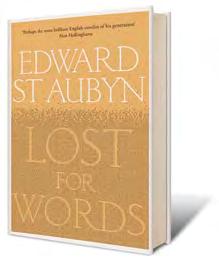
Seven Flowers by Jennifer Potter (Atlantic, £12.99)
Eye-opening history of the tulip, orchid, rose, opium poppy, lotus, lily and sunflower. The book more than justifies its subtitle of “And How They Shaped Our World”.
The House We Grew Up In by Lisa Jewell (Arrow, £7.99). One of the most reliably gripping story-tellers around, with a portrait of a oncehappy family falling apart.
Poirot and Me by David Suchet (Headline, £8.99).
Not that the autobiographical element has entirely disappeared. After writing fiction “of impeccable anguish and undisguised autobiographical origin”, one character now wants to “win his freedom from the tyranny of pain-based art”. With Lost for Words, St Aubyn has surely done just that.
The full inside story of the much-loved series from its much-loved star.
►

Long before the NHS, a doctor’s life was all chamber-pot injuries and medical mysteries

As a child, Deborah White-Cooper loved hearing her grandfather, “a natural story-teller”, talk about his long medical career. So when the family discovered his journals, she was sure—quite rightly, as it turns out—that they’d have a wider appeal. Call the Doctor begins in an era long before antibiotics, when hospital wards started the day with morning prayer; and when East End midwives were apparently still partial to a drop of gin and encouraged women in labour with the words, “Come along dearie, yer’ve ’ad yer pleasure—now yer going to ’ave yer pain.” It continues with Ronald’s experiences as a medic on the Western Front and ends with him back in South Africa, where he’d been born in 1892. At the heart of the book, though, are his 29 years as a GP in Dartmouth, Devon. Moving there in 1920, he made his first home visits by pony and trap.
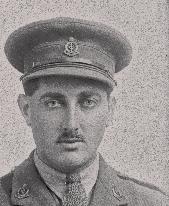
Ronald (pictured left in 1919) chose general practice because he wanted “constant variety”— and he certainly got it. In those pre-NHS days, we hear of “stout ladies” suffering “lacerations of the buttocks” after sitting down too heavily on their china chamber pots; of a 100-year-old man whose “main diet appeared to be eggs, meat, cheese and cider”; and, more sombrely, of “a devoted mother” who killed her two children during a bout of depression.
Throughout, Ronald’s tone remains kindly and sympathetic. Though he can sound slightly—and authentically—patrician, he’s never arrogant, writing with pained humility about the limits of medical knowledge. His own emotions are generally plain to see, even (or especially) when he tries not to make a fuss about them. After the death of his first wife, for instance, he admits that

r D e XC Lu SIV e : D e Bor ah
Wh Ite -Coo P er on h oW the Boo K Cam e a Bout
After my grandfather’s death in 1976, my family discovered a dusty old school trunk in the attic of his home in South Africa filled with fascinating family papers, including a collection of stories he’d written about his life as a doctor, from 1910 when he became a medical student to 1965 when he retired.
Many years later, my father passed these on to me. The notes lay in card folders, which my grandfather had labelled Random Reminiscences of a Country Doctor. Though rich in
“months of grieving” left him “rather rundown”.
The book, in fact, is so crammed with great stories—by turns comic, hair-raising and touching —that it isn’t easy to pick a single extract. Yet this is perhaps one of the more remarkable, not least because it seems a clear example of a condition that wouldn’t be identified until the mid-1970s:

Betty Thompson and her parents lived in a village not far from Dartmouth. They were a poor family; the father was a farm labourer, the mother took in washing. One autumn day I was summoned to the house, where I observed an anaemiclooking girl lying in bed. I was told she’d been there for three years, without the strength to move, and that no doctor appeared able to help. I, more recently qualified and up-to-date, could surely get Betty on her feet again? She was about 20, quietly spoken and gentle, with a rather sweet smile. I was determined to do what I could to help.
On reviewing her medical history with her mother, I gathered that one particular symptom had puzzled all previous doctors: the periodic coughing up of blood. I gave Betty a thorough overhaul and could find no trace of physical disease.
‘I think most of her condition is due to nerves,’ I told her mother, reassuringly.
‘But, Doctor,’ she said, ‘remember how often she’s brought up blood. Surely that can’t be nerves?’
The next morning I received a request to visit Betty as soon as possible. Under the bed was a large bowl of blood. ‘Now, Doctor, come and have a look at what the poor darling has brought up this morning,’ said the mother.
I agreed that it did look bad, and there was no doubt Betty was feeling much weaker for the loss.
‘Well, Mrs Thompson, there is only one thing to do,’ I said. ‘We must admit Betty into hospital, where we can X-ray her chest
►
Doctor on call: Ronald White-Cooper visiting patients in rural Devon
Call the Doctor: A Country Doctor Between the Wars— Tales of Courage, Hardship and Hope by Ronald White-Cooper with Deborah WhiteCooper is published by Pan at £7.99; ebook, £4.29
Betty had no haemorrhage, her X-rays were clear and a barium-meal test revealed no lesion. I was completely baffled
and do a barium-meal test. The blood is either coming from her lungs or stomach.’
Betty remained in hospital for three weeks. She had no haemorrhage, her X-rays were clear and a barium-meal test revealed no lesion. I was completely baffled, and so she returned home. I visited now and then, but she certainly didn’t require daily visits—nor could her parents have afforded them. However, from time to time I’d receive an emergency call from Mrs Thompson and there, under her daughter’s bed, would be a bowl of blood. It was a complete mystery, although I continued to believe that nerves were to blame…
…The mystery was solved the following summer, when her mother was spotted returning from the local abattoir with a bucket full of bullock’s blood! After giving Mrs Thompson a good dressing-down, I suggested that she might like to change her doctor again.
Years later I heard that Betty was still in bed, but that the vomiting of blood had ceased. The strangest part about this case was the mutual conspiracy between mother and daughter. I was puzzled both by Betty’s complicity and the sadistic pleasure her mother seemed to take in keeping her daughter in bed. Mrs Thompson clearly enjoyed the attention that we doctors continued to give her and her daughter; and, I suppose, the only way she could justify this was by faking the constant haemorrhages.”
This, of course, sounds like Munchausen syndrome by proxy also known as fabricated or induced illness (FII). It’s now defined by the NHS as “a rare form of abuse” that “occurs when someone who’s caring for a child, usually the biological mother, fakes or deliberately causes symptoms of illness in the child”.

an D the name of the author I S … Danielle Steel—and, indeed, only three dead authors appear to have sold more: (in ascending order) Barbara Cartland, Agatha Christie and William Shakespeare.
detail, his recollections contained few dates and were in no discernible order— probably as he recorded them in later life, many years after the events had taken place. So I searched for clues in the conditions and treatments he wrote about, as well as his descriptions of his patients’ characters, their lives and their
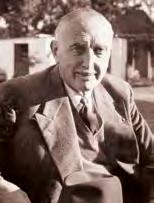
conversations. From this, I created a timeline based on historical events and medical fact.
Our family were great hoarders, so there were also many original documents to work from, as well as a vast array of photos. Drawing on my own memories of my grandfather, as well as those of other family members, I began to piece together the story of his extraordinary life.

Nicci French Nicci Gerrard and Sean French are the husband and wife bestselling thriller-writing duo known as Nicci French. Their books have sold over eight million copies worldwide. Thursday’s Children, the latest instalment in their Frieda Klein series, is out now.
Boswell wrote what is considered the greatest biography—that of his contemporary Dr Samuel Johnson. But this journal is an account of his life as an ambitious young man coming from Scotland to London to make his mark. What makes Boswell’s writing unique is that he finds himself so brilliantly interesting; every aspect of his cowardly or duplicitous nature is recorded, every embarrassing impulse (which writers normally gloss over) is noted with an eye for the most trivial but telling detail. As a writer I find it’s the minutiae of life that reveal the most about a character.
As told to Caroline Hutton
 By Virginia Woolf
By Virginia Woolf
I first read this as a teenager and have reread it about ten times, says Nicci. I used to have that beautiful picture of Woolf [below], looking soft and intelligent, on my wall alongside Che Guevara—my pin-ups at the time! There is something magic in Woolf’s writing; it was the first time I really felt an author had got inside people’s thought processes while also revealing the surfaces they present to the outside world. It was such a revelation to understand that people suffer the same, with our contradictory emotions and our difficulty in communicating. Yet there are moments of exquisite joy too, when sparks fly and a brief connection is made between people. The gossamer detail of her writing blew me away and clarified how much I wanted to be a writer.
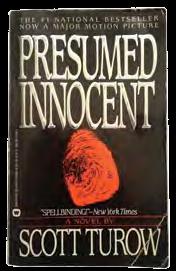
When we first met we were journalists and would show each other our work. We’d also discuss what we thought about the books we read. So many thrillers have disappointing endings, but not this cracking story. It shows just how powerful this genre can be as a means of exploring the kind of fears we experience in our everyday life. At its heart it’s an emotional domestic story but the gritty writing pushes it to another realm; it’s a terrifying novel with a brilliant twist. If readers finish our books and think I didn’t see that coming, we know we’ve done a decent job. ■
synopsis and sample chapters welcome, please send to:

CGC - 33 - 01, 25 Canada Square, Canary Wharf, London, E14 5LQ
0207 0388212
editors@austinmacauley.com



















win £50 for every reader’s joke we publish. Visit readersdigest.co.uk/ contact-us or facebook.com/readersdigestuk
¶ A man in a hot-air balloon realized he was lost. He reduced altitude and spotted a man below. “Can you help me?” he shouted. “I promised a friend I’d meet him half an hour ago, but I don’t know where I am.”
The man below said, “You’re in a hot-air balloon hovering approximately 30 feet above the ground. You’re between 40 and 42 degrees north latitude and between 58 and 60 degrees west longitude.”
“You must be an engineer,” said the balloonist.
“I am,” replied the man, “but how did you know?”
“Well,” replied the balloonist, “everything you told me is technically correct, but I’ve no idea what to make of it. And the fact is, I’m still lost.”
The man below responded, “You must be a manager.”
“I am,” replied the balloonist, “how did you know?”
“Well,” said the man, “you don’t know where you are or where you’re going. You made a promise you’ve no idea how to keep, and you expect me to solve your problem. The fact is, you’re in exactly the same position you were in before we met—but now, somehow, it’s my fault.”
Seen on the internet

The first scientist says to the barman, “I’ll have a glass of H20, please.”
The second scientist says, “I’ll have a glass of water too, please.”
Then he turns to his colleague. “Why did you say H20? I mean, I know it’s the chemical formula for water and everything, but it’s the end of a long, hard day and there’s really no need to intentionally overcomplicate things like that in a situation outside of work.”
The first scientist says nothing in reply. He just stares sullenly at his drink, furious that his H202 assassination plan has failed.
Seen at Reddit
¶ A nun was staring at the people in the street when she spotted a dishevelled tramp leaning against the door of the convent. She ran down and handed the man £10, saying, “Be hopeful.”
A week later, the same man returned wearing new clothes and gave her £10.
“No,” she insisted. “That was for you.”
“No, no, that’s for you,” he replied. “Be Hopeful came in at 100/1.”
Anthony Grace, London
My wife told me the other night that she only married me because I’d said I was rich.
I am— although I prefer to be called Richard Seen at 9GAG
A friend of mine asked, “If you could have any superpower, what would it be?”
I said, “ColdWar Russia”
Comedian Chris Turner
royal rumble Online trolling is nothing compared with some real ancient disputes. #MediaevalFacebook reimagines famous rivalries in the world of social media—as in this memorable exchange between the two Wars of the Roses enemies:

Inspired by some bizarre real-life examples (“Forty-year-old guy wants 12-stone woman to lift up, no questions asked”), Brighton comedian Phil Lucas has been posting fake adverts in shop windows since 2012. Here are just a few, as seen at buzzfeed.com:


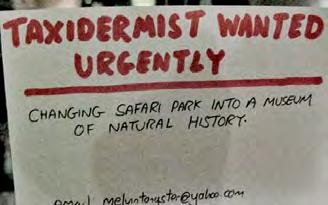




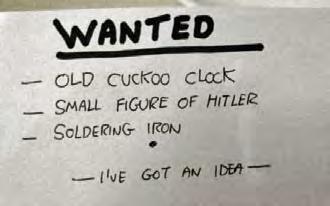
¶ A lawyer visits his client in jail. “I’ve got good news and bad news,” he says.
“Give me the bad news first,” says the prisoner.
“Your blood was found all over the victim’s house,” replies the lawyer.
“So what’s the good news?” asks the prisoner.
“Your cholesterol is quite low,” the lawyer answers. Stephen Gee, Wiltshire
¶ To get over my obsession, I threw away all my books
about Dusty Springfield. Now I just don’t know what to do with my shelf. Seen at Reddit
¶ I can give you the cause of anaphylactic shock in a nutshell.
Comedian Gary Delaney
¶ What’s the difference between a clown and a man having a mid-life crisis? The clown knows he’s wearing stupid clothes. Jake Cooper, London
¶ A woman goes up to her hotel roof to sunbathe. No one is there, so she slips out of her swimsuit. But a few minutes later, she hears someone approaching.
“Excuse me,” says the hotel manager. “Could you wear a bathing suit please?”
“But I’m all alone,” she replies. “What difference does it make?”
“A lot, actually,” says the manager. “You’re lying on the dining-room skylight.”
L B Weinstein, by email n
“The size of my head is neither here nor there.
It’s the hole that it’s stuck in that’s too small”
“Never eat your own fur in a month without an r in it”
“Stop licking yourself there, dear. It’s terribly middle-class”

downton tabby!
From Downton Tabby by Chris Kelly (£8.99)
“I’m sorry I bit you. In that terrible suit, I thought you were a penguin”
Grab a cup of tea and a biscuit and bend your mind to these puzzles, ranging from the mildly puzzling to the pen-chewingly fiendish
Shoot that poiSon arrow
This puzzle, based on a well-known optical illusion, invites you to match up the arrow flights with their arrowheads. If you pick the correct six, they will spell out an appropriate word.


Sudoku To win, you have to put a number from 1 to 9 in each outlined section so that:
• every horizontal row and vertical column contains all nine numerals (1–9) without repeating any of them
• each of the outlined sections has all nine numerals, none repeated.
If you want even more of a challenge, try timing yourself too.
difficulty HHH
MiSSinG link
Can you calculate the mystery number in the bottom circle?
* Entry is open only to residents of the UK, Channel Islands, Isle of Man and Republic of Ireland aged 18 or over. It is not open to employees of Vivat Direct Limited (t/a Reader’s Digest), its subsidiary companies and all other persons associated with the competition.
So, (68 – 24) ÷ 4 = 11.
Missing link: 68. In each case the number at the top is subtracted from the number on the right. The answer is divided by four to give the number on the left.

within: 15 minutes, you’re a true expert; 30 minutes, you’re no slouch either; 60 minutes or more, maybe numbers aren’t your thing.
Sudoku: If you solved it
The word FLIGHT is formed.
Shoot that poison arrow:
£50 prize question
(answer published in the June issue)
Solve the clues and place your answers into the pyramid. when complete, the 14 letters can be arranged to make a farmyard noise. what is it?
CluES
A party (2)
Large European deer (3)
Extinct bird (4)
Chocolate ingredient (5)
The first correct answer we pick on May 2 wins £50!* Email excerpts@readersdigest.co.uk
answer to March’s prize question:
B. Each line contains two blue frames and a yellow frame. Each line contains two blue crosses and a yellow cross. Each line contains a blue circle, a yellow circle and no circle. The missing picture must have a blue frame, with a yellow cross and a yellow circle.
and the £50 goes to… Gladys Dawson from Aberdeenshire











w I n £100 and a Cartoon pr I nt

Think of a witty caption for this picture and you could beat the experts at their own game. The three best suggestions will be posted on our website in mid-May alongside an anonymous caption from our professional cartoonist. Visitors can choose their favourite—and if your entry gets the most votes, you’ll receive £100 and a framed copy of the drawing. Submit to captions@ readersdigest.co.uk or readersdigest.co.uk/ caption by May 9. Vote online at readersdigest. co.uk/caption. We’ll announce the winner in our July issue. n

The competition was much closer this time, and cartoonist Percival nearly scored with his original caption, “He’s gone mainstream.” But he still came off second best, courtesy of reader Simon Ayres’s caption, “No, you can have her, Dave. There’s plenty more fish in the sea.” Yes, yes, it’s an old pun, but it certainly earned the affection of our voters!
scoreboard readers 20 cartoonists 7
• ...we visit copacabana beach
• ...meet the little girl who made medical history
• ...find out how to cope when your partner dies
PLUs stephen mangan irvine welsh

...and we talk tough with Viggo mortensen, star of The Two Faces of January
facebook.com/readersdigestuk twitter.com/rdigest








SEBO vacuum cleaners help make cleaning easy. Light to push, with comfortable handles and long cables, using them is a breeze. High technology filtration ensures that all the dust they capture is safely trapped inside, protecting you and your family against harmful allergens, as well as keeping your home clean. Some models even filter out odour, which is great if you have pets.


As the world leader in professional upright vacuum cleaners, SEBO knows how to make reliable, high performance machines. Made in Germany, they are built to last, so you can enjoy their user friendly design for a long time, which makes a refreshing change these days.




SEBO – the vacuum cleaner professionals
For a chance to win a SEBO vacuum cleaner, enter our monthly draw at: www.sebo.co.uk
www.sebo.co.uk
01494 465533



